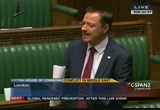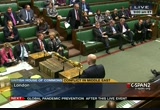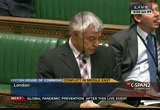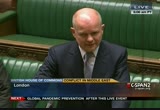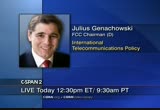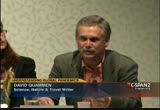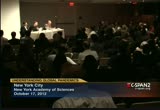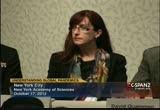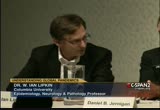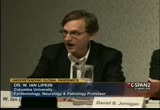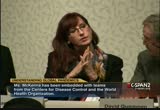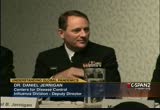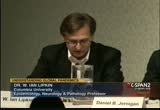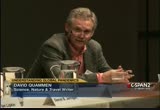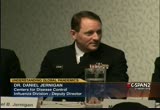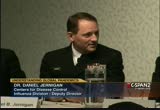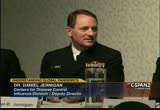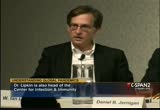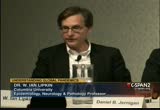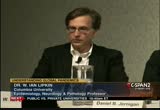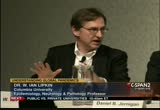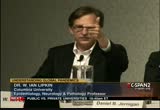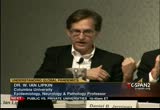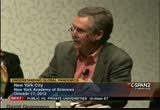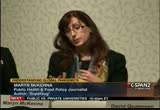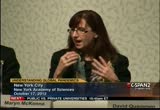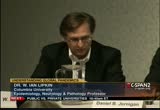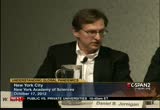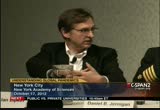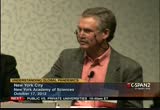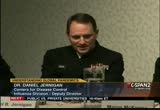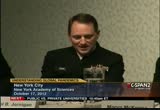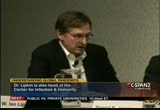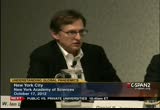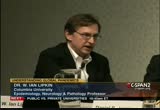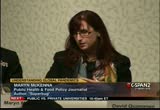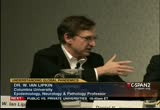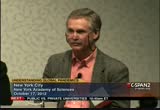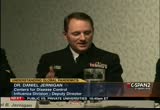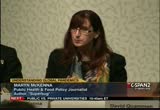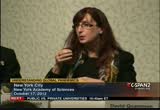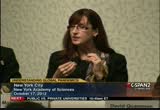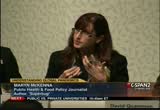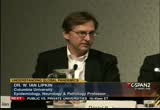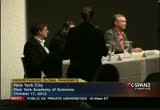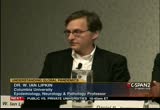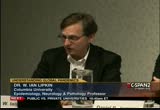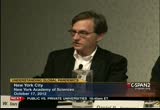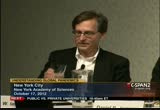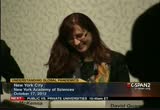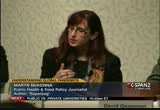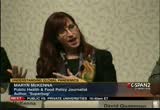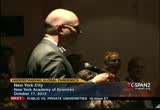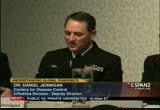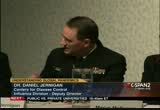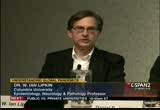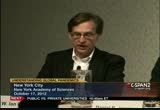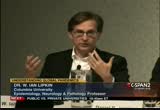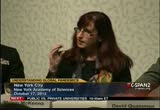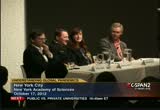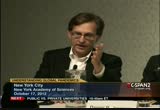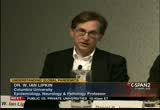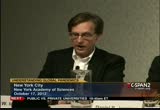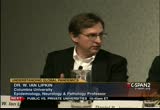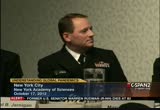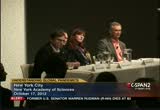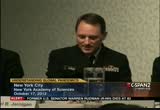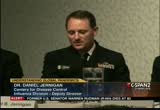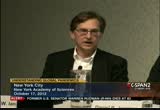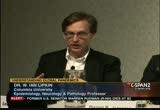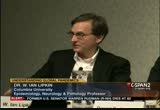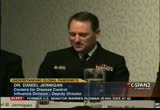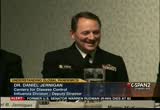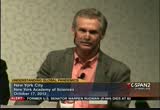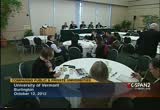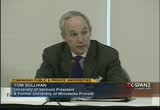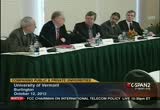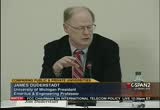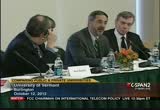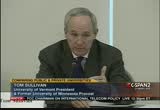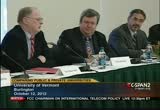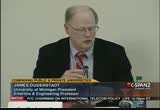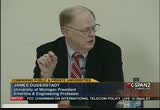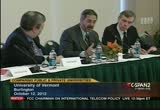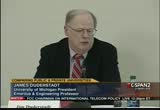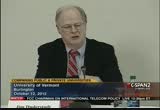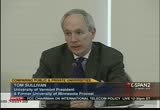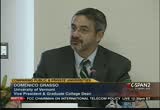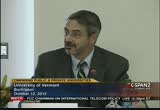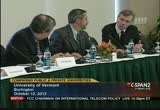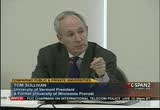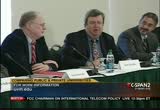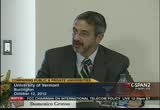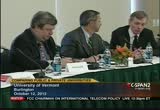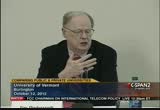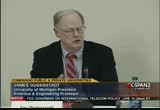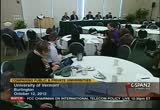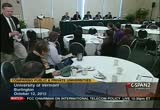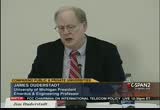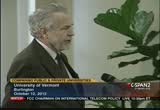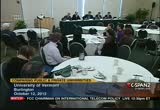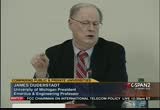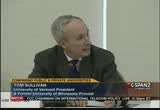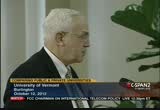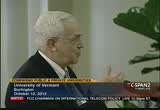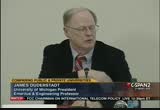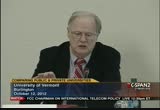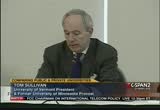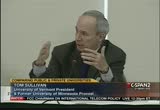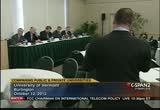tv U.S. Senate CSPAN November 20, 2012 9:00am-12:00pm EST
9:00 am
access in and out of gaza, greater assurance of weapons on going into gaza on many aspects of the stick will discuss that with the united states as was with egypt directly. >> i declare an interest i just returned from a visit to the palestinian authority's, and to israel. the foreign secretaries call that hama hamas is defensible response but for the crisis and could end the conflict by stop bombarding israel was hard. does he agree with me that the use of long range imported missiles by hamas capable of striking jerusalem has made this much were difficult to achieve? >> yes, absolutely. it is clear that the armory of rockets in gaza has changed since the time of operation, and although there is a longer range rockets, we seen them launch at tel aviv and at least in one case at jerusalem. of course that is an escalation
9:01 am
of the threat to israel. but it only underlines the importance of taking forward all the work on a negotiated piece and settlement in the middle east so which has been supported across the house. >> in august this year in a report that gaza would be unlivable by 2020, 44% of posting in gaza -- [inaudible] what conversation has he had with counterparts recently on increasing basic humanitarian coming into gaza and that continues to increase? >> this is a constant part of discussions with israeli leaders. of course, we put the case for that, and, indeed, more than that, in saying not only that humanitarian relief is required but that the difference in more an open approach is required. and that actually tight restrictions serve the purposes of hamas, rather than directly
9:02 am
with the purposes of israel. and sometimes help to fund hamas with the operation of smuggling and use of tunnels into gaza and so on. so we will continue to have those conversations are i hope more successfully in the future. >> the civilian populations of southern israel and gaza desperate need an immediate necessity cease-fire. that means no rockets, no air sucks, no landed fish. what hopes does my right honorable friend have of you suggested of being able to broker that immediate and lasting cease-fire? >> well, there are some hopes that i don't want to overstate the mountain because of course these things go wrong, and anything at any moment as beek can go wrong in terms of endangering this process through some events on the ground or breakdown of what i've been looking for for cease-fire. at the u.n. secretary-general have put energy behind this. egypt is playing a strong role.
9:03 am
the visit of secretary clinton will bolster that, and all of us in the e.u. countries also determined to do so. so a lot of effort is being made behind this cease-fire proposal. >> cannot press the foreign secretary to say something more about what the future conversations he had with his fellow e.u. ministers on gaza, and also what conversation she's having with the special representatives of egypt's? >> well, we have the whole e.u. a fair council meeting yesterday, and there were the conclusions published from that, calling and very much in line with what i've said to the house in terms of the need to end rocket attacks on issue but also as a support for a negotiated caesar. so the whole of the e.u. year and spoke together on that yesterday. of course, we also regulate discuss matters with tony blair, the envoy of the quartet to the
9:04 am
palestinians. i most recently spoke to him 10 days, nine days ago about this. my colleagues are in constant touch with him, and we will see whether that can be a role for the quartet in the coming weeks, in trying to restart negotiations on the piece process. >> the foreign secretary is very clear he believes that hamas bears the principal responsibility for the start of the current crisis, but does he not accept that there are many people who believe the blockade of gaza amounts to an act of aggression perpetrated by the state of israel against -- every single day whether a rocket or a shot is fired? how does he believe that assigning blame on hamas in the current situation will help the government to work with both sides to eight achieve a peaceful resolutions because i think we have to be speak included about these things, and he is right that restrictions
9:05 am
and blockades are part of the problem here, not part of a solution. we are always clear about that, and i think the current of yet another crisis in gaza adds to the argument about the. would also have to be clear that the firing off of hundreds of rockets at israel certainly does not help and is now tactic designed to get rid of any blockade or restrictions. it has always and totally counterproductive effect as well as being directed at the killing of civilians. and so we shouldn't hesitate to criticize that just because want to see a wider solution. >> in light of the blocking that russia and china has taken against syria have that actually contribute any money to the humanitarian crisis that now exist in syria? >> i think occupation from russia and china have been very small. i will have to write to the honorable lady with details
9:06 am
about the. they are not so large that have been committed in my mind, let us put it that way. we will encourage, i have encouraged before russia to make a contribution to those u.n. funds, but the biggest contribution, the biggest occupation comes from the states emphatically from the european union, third from the united kingdom. and, of course, we are also contributing the european union money. so the backing for these things is very heavily western as things stand. >> i know the foreign secretary said he didn't want to debate about the portion it or proportion. but while he is right to condemn militant rocket attacks would not also condemn the loss of innocent lives, particularly children? and with respect to both the u.n., is he out to be convinced that by taking the stance of the u.n. come uk government is to be taken, he doesn't risk undermining those who want to see a peaceful solution?
9:07 am
>> does. the government and the whole country is deploying the last, loss of life, particularly children with first line our second sentence of my statement today, and i reinforce that now. and just our position i think as i've explained the reason why we are so concerned about a boat coming out of the united nations is precisely because we think that will make it more difficult to advance the piece process. will make every effort to try to prevent damaging the piece process, but the likelihood is that it will spi spent cannot ps the foreign secretary once again on the importance of ending the blockade that we have to make progress in the piece process that's already been mentioned, the invite the blockades having on the palestinian people in terms of the destruction of its economy. but there's also benefits for israel. there's a thriving, economy currently because of the
9:08 am
blockade. most of the weapons that are being used currently in gaza come through that tunnel economy. it could be a win-win situation if we can move progress forward on this issue. >> i don't think i need pressing very much, i was just taking part at that point myself about the tunnels, hamas profits from that rather than security of israel. so the smuggling through tunnels, so that is right. for it to be a win-win, however, there have to be some great degree of trusts and piece on the border. and that is what has eluded us all so far. but i if it can be brought abou, there can be a very big win-win for all involved. >> after 23 years in houston for foreign secretary will knows the fact that it would have been a doesn't prevent it being remade. you should on occasions. are adequately and sometimes at length. >> [inaudible] has the foreign secretary been able to make an assessment as to whether uk made
9:09 am
components are being used as part of israeli equipment in gaza? and what implication do actions other than recent today's have a uk military links with israel? >> as the honorable lady knows, and she has risen -- raised an issue which no one else has which is good after an hour 40 mins, so i thank her for that. we have very tight export controls through the consolidated guidance. we always evaluate any export licenses, arms, export licenses against the risk of misuse, of intensifying conflicts that are being used for internal repression. that doesn't lead us to refuse export licenses. some export licenses to israel, but to grant others begun of course any future granting or refusal of licenses will become considered against the background of recent events spent i think the transit and
9:10 am
colleagues for their assistance to in a moment, 65 backbenchers were able to take part, thanks to colleagues and 66 minutes of exclusively backbench time. i fear there are points of order. spent as this statement comes to a close now, british foreign secretary william hague making news this morning announcing that britain has moved to formally recognized the newly formed syrian opposition as the sole legitimate representative of the syrian people. follow in footsteps of france last week which become the first western nation to officially recognize the syrian national coalition. the ap also reported in the u.s. has also recognize the leadership by as a legitimate representative but stopped short as describing as a sole represented. they say the first must group -- quick reminder that will have more from the british house of commons tomorrow as members present questions to prime minister david cameron.
9:11 am
live coverage starts at 7 a.m. eastern here on c-span2. spent we have more live programming coming up today on the c-span networks. the nest its policy toward the middle east be focus of an event at the woodrow wilson center. we'll have that for you begin at noon eastern on a companion network c-span. back on c-span2, halfhearted it's julius genachowski. you will talk about documentation sponsor. this comes to life in the council life in the council on foreign relations. and be sure to join us tonight for an event from the washington ideas for. it likely roundtable discussion with president obama, look at america's strategic competitiveness and a speech about drones warfare. again that starts at 8 p.m. eastern right here on c-span2. >> there are many people who might even take issue with grant saving the union during the civil war, didn't lincoln do that? well, yeah, he did and i'm not going to say grant was the only
9:12 am
person who saved the union. but he was the commanding general of the army that put blankets policies into effect. and he was the general who accepted the surrender of the army of northern virginia. under robert e. lee the end of the war. so if anybody won the war on the battlefield, if you could say that any one person did, and, of course, you can't, but one of the people we'd dashed things we did in history as we generalize because history reality is simply too complicated to get our heads around if we do with it in its full complexity. so grant saved the union during the civil war, and i do contend that grant saved the union during reconstruction as well. >> from obscurity and clean as annoyed to a courthouse in appomattox and 1600 pennsylvania avenue, h.w. brands on the life of you this is grant thursday night at 10:15 p.m. eastern, part booktv is four-day
9:13 am
holiday weekend starting this thursday on c-span2. >> a group of panelists discuss emerging infectious diseases and how to reference global pandemics. this took place at the new york academy of sciences. participants also talked about the origin of viruses and listed deforestation, international travel and the growth of mega- city as cell phone reasons. following the remarks at the questions on the audience. this is about 90 minutes. >> thank you very much. can you all hit me? and thank you all for coming out tonight. making explained one thing that i then wondered about which was, had been told about the seven deadly sins series but i had forgotten and i couldn't figure out where they got that title. so that's what we'll be talking
9:14 am
about tonight, are distinct panelists will be talking about. although it struck me that might make sense to reverse that and turn rasco spiral into viruses go rasco. and i think that's really what we're going to be getting them. i'm going to introduce our three panelists, gigabit a biography about each of them, and then start with some questions. will be done by 830 time i. i have some question. we've talked about some questions to put to the. i hope maybe they'll put some questions and challenges to one another. i hope maybe even do disagree or contradict one another on certain things, and talk among them as well as to his. i always think the panels are a little bit more lively when there's interaction. and then we'll ask for some questions from you all. and then we will adjourn and have a little reception. thank you for being here.
9:15 am
first all the way down on the, dr. ian lipkin, who is in, indeed, john snow professor of epidemiology and professor of neurology and pathology at columbia. international recognize for the department and implementation of molecular methods. if i recall correctly, ian has talked about his profession into words as bible discovery. he directs the center for infection and immunity, the world health organization collaborating centre on diagnostics, surveillance and immunotherapeutic for emerging infectious diseases. and northeast biodefense said and his coach of the national bio surveillance advisory subcommittee. no shortage of serious credentials. he took his indeed at rush medical college, medicine residency at university of washington, fellowship with michael old stone, famous dizzy
9:16 am
spell, and then he served in beijing as an intermediary between w.h.o. and the chinese government during the sars outbreak 2003 which is something i suspect we will talk about. he codirects sars research efforts in china with current minister of health. >> daniel jernigan, captain dan, is in, indeed, miles per hour, captain indiana state's public health service answers as the deputy director of the influenza division and the national center for immunization and respiratory diseases at the cdc. he came up from atlantic city. dr. jernigan serves as senior medical officer and senior public health service officer for the influenza division which is responsible for oversight and direction of approximately 300 staff members, policy, preparedness and program.
9:17 am
in addition he serves as principal investigator for influenza research and public health evaluation activities. and certainly will talk about influenza tonight. maryn mckenna, my colleague is a science writer, is a journalist and author who specializes in public health, global health and food policy. she is a blogger for wired, a columnist and contributing editor for scientific american, anti-senior fellow fellow of the schuster institute or investigative journalism at brandeis university. her work has appeared in self, e-guardian, nature, the atlantic, china "newsweek" and many other publications. she's the author of "superbug" which is a wonderfully detailed book about mrsa that i am reading now, and i highly recommend. and beating back the devil. free press published the first and also the second. she has embedded with teams from
9:18 am
the center for disease control and the world health organization to report on malaria, polio, west nile virus, mdr-tb, sars, hurricane katrina, the indian ocean tsunami, and the anthrax letter attacks on capitol hill. >> she's a real party girl. [laughter] >> maryn graduate from georgetown university and has a master's degree from northwestern university those of our panelists. so, let me start with a very, sort of a historic question, their agenda. the late 1960s we were hearing that infectious diseases were over, that we have solved that problem, we had all these wonderful antibiotics and it was thought that i was going to be enough, along with others
9:19 am
isolate antiviral drugs to some extent, and it was thought by some chemical in some very it could people who should've known better you would think that we had closed the book on the infectious diseases. but that clearly was very wrong. so why was it wrong? what has changed so much? what led to that mistake in prediction? >> i guess i am looking at you first, tremont. >> i think wasn't just antibiotics although that's a we always talk about. in the 1960s there was this extremely heady notion that science could solve everything. right? so we're going to have cars that could fly, for example, which i guess if something were waiting for a few minutes ago. we were not concerned about pollution. we were concerned that running out of energy or of everything else that democracy would be triumphant. so every one was quite optimistic.
9:20 am
i think we've become more realistic as time has gone. that said, there have been many things have changed. you alluded to some of them, the fact that antibiotics have become less effective. during the second world war, just as penicillin was first introduced, it took 30,000 units of penicillin take your pneumococcal pneumonia. so an effect people would recruits allies and reuse it. it was so expensive but so powerful. and now we use millions of units and in many instances the drug doesn't work at all. there have been major changes in the landscape. we have a global world now which is you can get anywhere you like very, very rapidly. jfk, for example, has 21 million international visitors a year. we can reach 72 countries with a nonstop flight. so anything over there can be
9:21 am
immediately. so we are beginning to see diseases going global. indication we've had a lot of deforestation. without changes in land-use which result in exposure to animals that we didn't have before, so when tony fauci talk about this, he usually refers to in the context of hiv which, of course, is a big pandemic that concern us all. but obviously there's been many more, and to write about them very eloquently in your book, which i highly recommend. >> thank you. maryn, what about viruses? why did we suddenly start hearing more and more about viruses, serving not to the exclusion of bacteria? >> so you ask -- [inaudible] >> you know, i honestly don't know that i can answer. because i don't think of
9:22 am
bacteria as something that's been beaten. actually i think about what ian was thing about the moment we had in the late '60s how science is going to solve everything and at that point even the major resistance that you have not yet emerged. mrsa had yet to emerge. but i think for why viruses -- i'm going to have to lob the table back to the rest of the table. >> if you take flew as an example, it's an rna virus, a lot of people think that they are more likely to replicate a whole lot more. it is a virus that has not just one genome that has eight gene segments in the. answer each of those genes kind of code for different protein or a different function. and so the thing about it is that the virus connection to exchange its genes from one person to another, if an
9:23 am
influenza in a big a summit able to get influenza from a human, they can sort and so there's this endless capability for these things that are probably not that accurate and their replication. they make copies of themselves. and maybe a lot of errors in that which may help out for evolution. plus they're able to switch genes with each other. so you are able to create these viruses or create change in the virus that can really take off in people. just a whole lot more of them. viruses can infect bacteria. you can get viruses infecting people. viruses everywhere. i think there's a whole lot more of them, plus they have this capability to choose be able to completely change themselves. >> i think dan has addressed the biology portion but there's another one which we trained in medicine can probably about the same age. we would make, we would say it's vital. so there was this sort of the
9:24 am
default. it isn't as it's a viral, and we couldn't really distinguish amongst all the viruses. whereas now our ability to ascertain what's action associated with the infection has changed so dramatically. we know so much more about it. so where as we could was a much, now we can say it's a rhinovirus to detect rotavirus. it's a herpesvirus. so this has made a huge difference i think in terms of public consciousness, viruses. but there are definitely differences in the way in which we are exposed to infectious agents and then was present even as early as 1960. so there have been something like, i don't know, 70 new infectious agents that i can show on a slide that are transferred to come up since in which we did not have those days. various hantavirus is.
9:25 am
coronaviruses and so forth. which we would not have been exposed to if we hadn't opened up forests and come in contact with all these other thinks. >> you mentioned that before and want to turn back to that. you mention come into contact with animals to you mentioned ecological destruction. i think we have to introduce another basic element. a lot of these viral diseases, the majority of them, are zoonotic, right? coming out of animals. zoonosis is an animal infection that is transmissible to humans, and the surveys of diseases i've seen say that roughly 60% of our infectious diseases are zoonotic diseases. so they're coming at us from animals but i want him back to what you sing later about diagnostics, the new capacities and tools of diagnostics. but let's talk first about the
9:26 am
emergence of these things, where they emerge from and why they seem to be emerging more now. somebody want to jump on that? >> from a flu perspective, really what we're talking that is avian flu or bird flu. flu viruses are largely circulating into reservoirs are generally. waterfowl, ducks and keys, that's the national -- natural reservoir. and then pigs as look at the opportunities for those things to come together are certainly more now than they ever have been. there's a couple of things crowding is one thing i think it really allows for there to be more chance for there to be a person able to get something from an animal. there's density of populations. i think there's 23, over 10 millio10 million in happen iw
9:27 am
because like to in 1970. it's been increasing dramatically, the density of our cities. we also have dense poultry and dense transit populations as well in order to feed the cities that of all these people that are gaining in the wealth, having increase in appetite for meat and, frankly, billy to just keep insisting that possibility with me just to bring it into the city or and the cultural practices are often that they want to have live birds for sale or live pigs. birds and pigs never easy to move around the you can move them into live the markets. dense populations altogether where an introduction from somewhere far away can lead to a bird being brought and. we know that from the age five -- when a distant farmer starts, it can be very stable, poultry. the bird flu.
9:28 am
they dumped them on the markets into the cities and then they sell them. so that kind of a situation is one where it just is bringing these passages from very far away to where all the people are. so the credit, the connectivity is there, so travel from the larger cities from one to another. is easier than it ever has been in this convergence of humans, poultry, pigs, people, all of that coming together in these very tense spaces i think that it's a situation that witches were probably 40 or 50 years ago's. was interesting what you just said is the underlying economic pressure that's causing on the height and/or the rising end of the economic scale, or economic curve is the increased appetite for protein and the rising economies of the developing world is causing sort of western-style industrialized farming to move into the east, which is probably not going to
9:29 am
be as secure except in some areas as we would like it to be. on the other end of economic curve, the movement of people into the forested areas and their develop looking for bush meat, for some agriculture reasons because it's cheap, because you can go into the forest and catch them. so people who are not benefiting from the rising economies are just as exposed to novel viruses as people are who are benefiting from rising economies. >> ian, you mentioned a virus, and that story involved industrial scale animal husbandry as one of the factors. would you tell us that story? give us an outline of the spillover and spread? >> there's an interesting segue
9:30 am
there, into talking about bats it one of the world's experts on that viruses, over the, -- charlie, just raise your hand. so, charlie is a virologist who for many years was engaged in a lot of diagnostics primarily antibody diagnostics at the centers for disease control in fort collins, colorado. and he wrote a paper a few years ago which talked about bats and the fact that the bats are reservoirs for a large number of different pathogens. we have people and injure a and sars, and many others species let me just parenthetically ask, would you describe what a reservoir or a reservoir host is? what host that place kick was classically when we think of a reservoir it's an animal that is
9:31 am
capable of being infected, carrying the infection for long period of time. and literally serving as a reservoir for infection of the species to quickly what happens is there's an end host like humans where it doesn't, the virus doesn't replicate particularly well. so it doesn't really spread from human to human in that fashion but there is a reservoir which then allows infection of humans. so examples might be west nile virus to people who have very high levels of west nile virus growing in their blood, but birds may do so. so if you miscue name of back and forth between verse and affect one person and another person and so forth. whereas with an influenza viruses once it moves out of a bird into a pig and from a pig to a human, with the exception of h5n1 that doesn't do this very well, they can spread from human to human. that's what makes it so sort of dangerous. so the story was an interesting
9:32 am
one from both scientific as well as political viewpoints. and if i screw this up, charlie, correct me. so several years ago, a few years before this disco in the late '90s, there was -- and affect the area where it was first described in australia were a horse trainer became infected and taken care of a course that was ill. he became very ill and died. and as result of investigation of the outbreak, a number of tools were developed that allow people to recognize which is typically what happens when there's infection, outbreak, people tried to develop tools, six figure out what it is. and i think the one who develop those tools might have been tom qaeda or bill in cdc. i'm not certain who was picking the, a few years later in
9:33 am
malaysia, there was an outbreak of encephalitis the groceries about this outbreak of encephalitis is that it was only involving chinese men. malaysia is a majority muslim country. and chinese men were different than the majority of the laymen in that they were quickly involved with farming pigs pic because they eat pigs as part of that culture. and the only men who are dying for the men who are pig for mr. now, there was a report that came out of the malaysian government suggesting that this encephalitis with japanese encephalitis virus. so they began vaccinating people for japanese encephalitis virus, and it didn't stop the outbreak at all. now, when it became clear this was not the problem, there was another virus entirely that was really done, that work by recognizing the fact it was this other virus related to hendra, there was a political problem
9:34 am
because you had investment. you miss called it. so my understanding is that somebody who's very politic had to say to the malaysian government you've done a brilliant job of taking care of the japanese encephalitis outbreak and will help you with this new outbreak. [laughter] and there wasn't any drug for so basically it's a pleasure taking all the infected pigs who had his curious respiratory syndrome and then encephalitis and burying it in large covering them with line and stand at the outbreak in that fashion. and those particular pictures with the bonds that we used in contagion for those -- who has seen the movie contagion? oh, come on. that's not very good at all. [laughter] so in the big line hit that you see were modeled right from those pictures that we have from those outbreaks in malaysia. i've completely lost the sight of what i was supposed to talk about. [laughter] you are getting around to bats
9:35 am
spent okay, and then -- >> will come back to contagion later on. >> so the origin of this virus was a bad reservoir that infected pigs. and some have a very bright idea that if you want to feed the pigs easily you plant mango trees next, so the food is right there, you can do it right in there with the pigs and it works out fine. unfortunately, the fruit bats very much like to eat mangoes, and as they would be to make us, because they were infected with this virus, happily living with them they would secrete virus which would then be consumed by the pigscome and ago. now, the big mr. came about a few years late in bangladesh where nobody was eating pigs. but because we knew this virus, the question came up how we going to solve this and? how are they getting infected? been some very clever people, many people, jon epstein is here
9:36 am
in new york and others, begin to look at bat reservoir of any area in what they found was that bats were flying over the large containers that would sit next to the trees, like a collection of palm sap that would then be sold in the market place and they would urinate, spit, whatever fats do in this palm sap you think people were getting infected the following day as he would drink the palm sap. so so disillusioned with that one was to cover these collection vehicles for the palm sector so this would like they do the same with maple syrup. so bats contributed to the development with a bangladesh but by different routes.
9:37 am
>> is that okay, charlie? [laughter] >> now, i want to add one thing to do, and do, and they don't think you mentioned this aspect at least just then, ian, but part of this is a navy force of malaysia where these that's ordinarily would've been feeding had largely been destroyed and largely cut down. so the bats have been displaced from their native forests and, therefore, were not only enticed to come to the mango trees and the other fruit trees planted, but they were driven to look for food in human occupied habitats as both the animal defeat in a traditional habitat. >> you're right. >> maryn, you write a lot in "superbug" about the importance of evolution, of course in bugs
9:38 am
like mrsa acquiring capacity to resist antibiotics. and it's a very important part of it, but people tend not to think about darwin, and evolution in connection with diseases, even from you two guys can correct me on this if i'm wrong but evolutionary biology is not much talk, even in medical schools. but it's crucial if misunderstanding how pathogens become human pathogen and how they become more and more severe human pathogen. the evolution of perspective, can you say something about how that applies both to bacteria and viruses? >> i got myself in great trouble the other day by suggesting that anyone who doesn't accept the serious evolution is committing an act of bad faith if they take modern antibiotics. and then i got a lecture about
9:39 am
macro evolution from microevolution and the intelligence design but i think i turned my twitter off at that point. [laughter] yeah, so, you know, you're right but i think that people don't think about, they don't think about the evolutionary web. they'll think about the inevitable consequences of the actions that we take that set up the evolution of resistance in diseases, whether it's bacterial diseases such as mrsa or resistance in hiv is a perfect example of how we've had to deal with this rapid evil version in change in that virus after it emerged. spent let me -- you can watch this stuff happen. each year we have to make a new flu vaccine because this virus is continually finding a way around whatever has circulated
9:40 am
previously or whatever is in the vaccine itself. you know, through tools where we sequenced viruses, put them into trees and look at all the relationships. but that's, what we do as a living but i don't think we think of it as evolution. >> and a surprising hard for people to understand that, that people understand i think that they take the vaccine wants her to three times, and then have some degree of protection. but that they then have to take a vaccine every year for flu, not only as confusing in a policy sense but i think it devalues the vaccine for the but it does really matter if i skip it this year, not that important. hard to convince them. >> so, there's a lot of meat in their, some of which i agree too, some i don't. i think the fact that we have to take new flu vaccines, because
9:41 am
there are portions of these viruses that are conserved. we haven't found good ways yet using those proteins, but we should and we will. and i think at some point in the future we will have an effective, then, once-in-a-lifetime or at least once every few years flu vaccine. we are all working towards that, and the reason we found this was that people were looking at, i'm not going to go there. so, because it's too long. but let me just come back to a couple reasons why i think evolution should be considered, and i agree with, i think you should've held your ground. first of all, there are many different ways in which evolution takes place. with bacteria, you have this exchange of genetic material, and you can for some resistance gene which allows that bacteria
9:42 am
to survive. and, in fact, that's the foundation for technology is this principle that was developed by josh lederberg who is a member of this society. viruses, we'd like to talk about them having a unitarian genomic sequence by thibodeau. it's a whole population with a bell curve and you're just sampling right down the middle. but within that huge population, there's a fitness for all sorts of different if i ventured so if it moves him here to there, and this requires a slightly different property, then those genomes that are present within a population will begin to set a new set point describes the middle. so you're going to think about the viruses as a whole swarm of what we call quasi-species. and viruses as they reproduce their nuclei acid, every time they make, say a thousand, that
9:43 am
one error, so .1% error rate. and if you multiply that over minutes and hours, there's a lot of opportunity for different fitness environments. and in addition, flu viruses as captain dan was saying, have the ability out on to mutate in that way, but also they can exchange genome segments. if you've got an animal infected with two different flu viruses, it can swap out genome segments, and very rapidly develop a whole new landscape. and then take off. >> we have these viruses that are spilling over from animals and humans, and some cases they cause no symptoms at all. some cases they seem to become harmless passengers like there's a wonderfully gruesome and in the virus called simeon foamy virus but as far as we know, and let you guys have something more recent than what i know, it causes no symptoms in humans. it spills over him a monkey in
9:44 am
southeast asia and gets into people to contact, for instance, monkey temples where people are feeding these monkeys. and scientists said this virus despite the fact that it causes no disease because it's an indicator of contact close enough to transfer viruses and i could also result in the transfer of a really nasty virus. so some of these viruses have no clinical effect on humans. some of them caused outbreaks that are gruesome and relatively short like ebola and ended from fairly easy to contain and kills a lot of people, but it doesn't ride airplanes but it doesn't come out of africa and kill -- >> there've been people of actually come back to europe, for example, by been infected. and so it can happen. ..
9:45 am
>> some spillover and kill 100 pig farmers in malaysia, some like sars which i hope we talk about spill over and ride airplanes rather well and get to toronto and kill people there and get to singapore and ha knew and -- hanoi and kill people there and then either stop or are controlled, and i think it's fair to say that sars was controlled, it didn't burn out. and then some seem to be unstoppable like the influenzas and the pandemic strain of hiv
9:46 am
got passed, got everywhere. what is it in terms of the evolutionary biology, the evolutionary potential of these viruses or any other factor you want to mention that most determines which ones are going to be local, terrifying but local, which ones are going to be epidemic and can which ones can potentially become pandemic? >> we talk about animal and humans and human to human, but there's a role of technology in the spread of disease that is probably as important for some of these pathogens as just that human/animal interaction. with sars, i spent five weeks in taiwan at the peak of that, and what we were seeing there was an extreme explosion or sars cases mainly because of what happened in the hospitals. so the same we bowl la in uganda and other places where if you can get that infected patient to
9:47 am
a place where the technology is such that it allows for it to be transmitted, so talking about west nile virus, before flu i was in the hospital infections group at cdc, and we had four cases of encephalitis at a hospital. we were trying to figure out what it was. finally it turned out to be west nile virus. and we thought how in the world did they get that? it turned out that a person who had been infected had not had symptoms buzz driving her -- was driving her car and was in a car wreck and had had become a donor. she died, she became an organ donor, but the period right before she died, she received almost 30 units of blood. so the life saving technology that was used, we tested every blood unit, and in the last blood unit that she got, we found the west nile virus in it.
9:48 am
so that was actually a demonstration that unit of blood could get into a person, those organs just become really vehicles for carrying west nile virus-infected blood. she was never really infected. and then those organs were then put into people. so you can see where all of these different technologies, i think right now we're seeing meningitis because of technology. there are things, if that virus or that bacteria gets to the right place and then technology is there to allow for it to be spread, that's the thing that we want to be most aware of. and with hospitals in uganda working on infection control is probably going to be the best thing to prevent ebola from getting out and causing worldwide problems. >> there's another very simple piece of technology that we take for granted now but according to some accounts was perhaps very important in the early spread of hiv, of the pandemic strain, and that's the hypodermic needle that was being used in central
9:49 am
africa to inoculate people with various kinds of medicines including medicines to deal with malaria. and there weren't very many needles, so they were being reused. we're talking about the 1920s and the 1930s. and i think it's, there's a fine writer who's published a book called "the origins of aids," who -- he's not the only person who's developed this hypothesis, but he explores it and brings new data to the idea that french colonial doctors injecting malaria medicine and medicines to fight against various kinds of venereal diseases reusing needles may have been an important early factor in multiplying the hiv infection. prevalence. do you all find that plausible, persuasive? >> i find it very plausible, and
9:50 am
i would add to that that in many villages you have inknock lists who give vitamin b injections without whatever sort of precautions for sterility. the other thing in promoting this was actually the smallpox eradication campaign. the introduction of needles in this a very, very broad way which sort of made it much more acceptable to have these sorts of interventions. so i've heard that proposed as well. but i think there's no question but the most efficient way to infect somebody with these, you know, sexually transmitted diseases that we see, for example, or things like hemorrhagic fevers is, in fact, with injections, that is to say intravel now injections. >> the sars outbreak like in hanoi, not a lot of cases actually there in the initial spread. they didn't have a lot of ventilators. they had a lot of open windows.
9:51 am
people, patients were separated very far, but in those places had what we call flailed indue bases where a resident and somebody else could not get somebody intubated. >> flailed intubation? >> sorry. [laughter] >> just want to make sure everybody caught that with their ears, remembersterred that image. [laughter] >> but there certainly were people we described as superspreaders who released large amounts of virus, sometimes in fee cease as well as -- feces as well -- >> let me emphasize that for everybody, superspreaders. sort of the typhoid marys of these viral diseases? >> except that typhoid mary was asymptomatic. these people were symptomatic. there was one area in hotel metro poll where there was a corridor where somebody was very sick, and everybody sort of came through this corridor was at very high risk for infection. so we do see things like that.
9:52 am
and we don't really understand yet enough about the host, that is to say ourselves, to understand why some of us -- we understand some of this. i mean, there's some kinds of people that have imknew no deficiencies who are more likely to become infected if they are exposed, but we don't understand all the factors and contributive things like whether or not you become a superspreader, whether or not you become diseased if you get exposed. and now with the introduction of inexpensive genome sequencing for humans and other animals, i think we will understand much more about that shortly. >> you know, i think in sars there's two great examples of both how much difference technology makes, as you mentioned, and this is such an unscientific thing to say, but i think we have to admit it when it comes to the control of diseases, that the sort of role that luck and random chance play. i mean, one of those people from
9:53 am
the metropol hotel went to hanoi, checked into the french hospital, created a tan tsaic outbreak -- fantastic outbreak in that hospital, closed the entire hospital, and that was one of the better hospitals in hanoi because it was a private hospital. they didn't know he was coming. they didn't yet know sars was advancing. one person from the french hospital went to bangkok, the world health organization doctor, who stayed in the hospital to help them deal with their outbreak until he realized he himself was getting sick. he fled to bangkok for treatment, was treated by the cdc doctors there. they knew he was come, they adequately contained the -- even though it was not by any means the best hospital in bangkok, and there was not a single secondary transmission from that single person through bangkok even though there had been something like 276 secondary transmissions from a single person in hanoi. just because they knew he was on
9:54 am
his way. >> well, as dan said, there were two major hospitals in hanoi. one was the french hospital which is a private hospital, the other one was a public hospital. the private hospital had aggressive pulmonary toilets. so you've got somebody who has an infection deep in their lungs, and you give them an aerosol under pressure, and they come out, and you disengage, and all the stuff goes every which way. and that's where we have the greatest spread. now, the woman who worked this out who died almost ten years ago now was eileen plant who was there, looked into this in detail and sorted out, in fact, what was going on. >> one of the things that i think is very interesting about the sars experience, and part of the reason that we're talking about sars is because these folks, the professionals -- at least the ones i've talked to -- say that of all these scary
9:55 am
viral diseases, certainly influenza and hiv have been enormously consequential and will continue to be. but sars, which killed only about i've seen 770 people, and i've seen 900 manager, but somewhere -- 900 something, but somewhere around there, killed about 900 people of the 8,000 people that it infected which is, which are not huge numbers in this area. but colleagues of dan and other experts around the world have told me that, well, of all these one of the scariest is sars. that outbreak could have been much, much worse. we really, we -- humans -- really dodged a bullet with sars. so i wonder to what extent it was luck in that case, good luck as maryn suggested the role of
9:56 am
luck, to what extent it was really good early diagnostics, to what extent it was firm public health measures and, and this is the point that i'm getting to that i'd like you to comment on, to what extent it was the luck of where this occurred? it came out of southern china, it got into hong kong, it got to the ninth floor of the metropol hotel, and the superspreader spread it to a lot of people, and those people got up and got on their airplanes to go home. one woman went to toronto with the virus in her, somebody went to beijing, somebody went to hanoi, somebody went to singapore. and then in those places it was contained, it was stopped. well, now think about those cities. toronto, hong kong, beijing, hanoi, singapore. many of you have probably been to at least some of those. those are all command and control cities with very firm
9:57 am
governance and fairly to very good health care systems. what might have happened with sars if it, had it emerged in the oriental province of the democratic republic of the congo and came to a hospital in can shas saw and then maybe came to the airport? might it have been very different? >> it may have. i think there's a lot in that comment. but i think in toronto they actually had two waves. and so they thought they had it over, and, in fact, we had the team that had gotten rid of it in toronto come to us in taipei and educate us on how they had stopped it. but they ended up having a psychiatric hospital and some other settings where there was ongoing transmission. it was not known. and so they basically did not continue to detect, or they weren't as vigilant, and they had a whole second wave. so i think there's a real lesson
9:58 am
to learn there about you can't just assume something's over, tough really keep monitoring -- you have to really keep monitoring it. so i think that clearly had -- you can't assume that it's going to be over. >> we had a case in new york, um, and this was a fellow who actually worked in my center for a while, who was a singaporean chinese. he was here for a conference, he became ill. he saw a hotel doctor who told him he was good the fly, and he was enroute to singaporement when he got to frankfurt, he was so sick they pulled him out, located -- >> bsl4, i'm going to ask you -- >> they put him in a high level biocontainment, you know, right there at the airport, right? there's a portion, the robert caulk institute was a very
9:59 am
prominent institute where they were able to put him into containment. so if he'd stayed another 14 hours in new york, we would have had a high risk of an outbreak here. so there was a lot of luck. but the point you were making earlier, i think, is a good one. if you have a population that's immunosuppressioned and it has time to adapt and become efficient transmitting between humans, that would have been an unbelievably devastating problem for the world. so we are very worried about that, and that's why we have now amongst other things, we have the international health regulations of 2005 that have been adopted by all the member states of the united nations that says diagnostics, therapeutics have to be universeally distributed. now, in part that's because it's the right thing to do, but it's also a bit selfish. it's because we also realize that if we don't stop it here,
10:00 am
it's going to be here. that's the other aspect to it. >> i think just the thing about sars, too, is that it declares itself when it's ready to infect. i mean, basically, when you get fever, then you are infectious. and that alone, i think, allowed us -- it's not perfect. some people, i'm sure, were spreading a little bit. but somebody got feverish, you could actually do something about that. you could put them into a room, whatever. so it would tell us when we needed to do something. flu and other things don't. they can transmit before they make, they have symptoms. >> so you're talking about people shedding virus because they really grow sick enough to have to lie down. >> right. for that very reason we set up these fever tents so that people could -- if they had fever, they would go to the tent, they would get a swab for testing, but then they would be put in quarantine. that kind of work plus the enormous amount of infection control in the health care settings really did have an
10:01 am
impact on it. but for those viruses and bacteria or whatever that do not declare themselves early in the infectious period, you're going to have a hard time controlling them. >> i want to shift a little bit, um, and raise two more questions and then ask you for questions, so, please, get some questions percolating in your minds. i hope there are things that you want to ask these folks. but, maryn, it's your job as a science writer for the general public and my job and the job of our colleagues to explain what these guys do, to ordinary readers. and to entertain them, but also to educate them. how do you think we're doing, and what are the constraints against doing better? >> yeah, that's a really good question. um, because i think we all have seen for the past, oh, it's been -- how long has it been since the coming plague and the
10:02 am
hot zone were published? >> 20 years. >> almost 20 years, yeah. people love scary disease stories. for probably, you know, reasons that i think go way back in our cultural evolution. they are, they're sort of monster, under-the-bed stories. they're the modern version of stories we would have told ourselves around a campfire. so there's a tremendous temptation as a science writer to want to scare people, because audiences respond to that. but as a responsible science writer who wants not to create havoc, i often find myself wanting to, needing to ask myself the to what degree i need to pull back from that to serve sort of the greater good. and there's a really interesting -- this point comes up, actually, today in a really interesting way. not today at our panel, but just a couple of hours ago the new england journal of medicine put live on their web site what i think are the first two peer-reviewed papers about this novel corona virus in the middle east.
10:03 am
>> explain that a little bit more for people who haven't caught wind of the novel corona virus in the middle east. give them a sense of what that is, what you're talking about. >> ian knows this story much better, but he has limitations on what he can say. >> ian is on blackout. >> all right. so -- i think i just lost it. i are this magic little magnet inside my clothing. >> is this on? >> all right, i'm just going to hold this. um, so we were all just talking about sars. sars, it was discovered, was caused by a novel corona virus, corona like a crown when you look at it -- >> family of viruses, right. >> so, um, in september a gentleman of qatari origin who had been visiting saudi arabia became very sick, um, quite quickly with what seemed to be pneumonia. and his family were well off, and they paid for him to be
10:04 am
medevaced to london. while he was being treated in london -- you'll fact check me if i get this wrong, right? the international mailing list promed, which is run out of harvard, and if you don't subscribe, you should, it's fantastic. among other things, it was responsible for bringing the first report of sars to the world, and we can tell you that story the you like, it's fantastic. promed ran a note from a physician in yet that in saudi arabia saying that three months earlier he had had a patient with a very fast-moving pneumonia who actually died who also had suffered from what turned out to be a novel corona virus. not the sars corona virus, a slightly different branch of this family. so this has been of enormous international public health interest for about a month now, and it's been written up by the who and by the cdc and by the european cdc in their bulletin
10:05 am
which is called euro surveillance. all of those are open access. you can find them. so tonight the new england journal of medicine publishes the first two peer-reviewed pieces on this novel corona virus. one is a case report on the first -- what turned out to be that first case, the case in saudi arabia, not the case in london. this gentleman died very rapidly. it was a very fast-moving knew mow ya and -- pneumonia and renal failure. the second paper is an editorial written by the former adviser of diseases at the cdc who's now at emory university next door. and the question that he raises, and this is why this is important for science writers. in this editorial reflecting on this new outbreak in the middle east -- which at this point doesn't appear to be going very far, though i'm sure ian has much more to say about that that
10:06 am
he can't say -- what dr. anderson, the author of this editorial, raises is that just in the past 10 or 15 years if you go back as far as nepa virus in 1998, sars in 2003 and then pandemic h1n1 flu in 2009, in each case we found them faster. the genetic analysis was done faster, the characterization and description and as a result public health strategies were agreed to more rapidly. the problem with that is that the identification, the alarm over it and the agreement to form a public health strategy in some cases happened before we knew how big the outbreak was going to get. now, in this case that might be good, because if something's going to happen with this novel corona virus, we're really way down at the beginning of the curve. on the other hand, we might be getting alarmed a, a little too alarmed a little too fast. >> but -- >> we might be -- now ian's
10:07 am
going to jump in. >> the region, and the reason the saudis are so worried about this is that the hajj is just weeks away. so you have millions of people converging in an area where there's a potential -- if this is truly transmissable, human to human -- of a serious risk. it's the sort of thing we faced, you know, with pandemic h1n1. so if you don't jump out and make a vaccine for this and you're wrong, then it's a horrific outcome. and if you jump, then you're accused of, you know, being chicken little and claiming the sky is falling. so we have to take those kinds of measures. we have to be aggressive about these things. and we don't know yet well -- yeah, that's all i can really say. >> i have a lot of follow-up questions i would love to ask them about these things, but i think at this point why don't we let you ask some questions.
10:08 am
there's a microphone there, there's a microphone there. so if people have questions, please, please -- maybe you can just kind of go to the mic and line up, and we'll get to as many as we can. >> [inaudible] there's a bunch of kids in the audience, too, maybe they have -- >> right. we have some students from -- students from where, megyn? we don't know. south side high school. they're also very welcome to ask some questions, and we'll see -- and, please, do we want people to identify themselves? i guess it's not necessary. >> [inaudible] >> yeah. make your questions concise, and these folks will try and make their answers concise, and we'll cover as many as we can. >> i was just curious about what you thought about the controversy over publishing, um, i guess viruses in case they could b be weaponized and
10:09 am
whether those should be published or not, whether that's a real danger. >> a particular case in the past year in rotterdam is and elsewhere on whether it's possible to create a form of bird flu in captivity that's transmissable, is that -- >> yeah. >> yeah. >> we had a meeting here at the academy a few months back on this point. what you're referring to is either called dual use research or more properly, gainer function research. and what was described there was a med by which -- a method by which a virus which was not capable of ready transmission from human to human or even from mammal to mammal was converted into something that could do so. there were several issues that came up there. one is should the work have been done in the first place, and if it was done, what do we do about it? and everyone is in agreement that the time to make decisions about whether or not you're going to do the work is not at the time of publication, but at
10:10 am
the time you decide to do the work in the first place. the question is whether or not we learned anything as a result of this that is going to change the way e do business, and the answer i think there is no. i've said that in writing, and i feel that's true there are many different mutations that would be capable of changing transmissibility, and it's not clear that it was the one that was going to make the difference. now, my concern is not so much that people are going the take these sequences and use them to make new viruses, but my observation that there have been many instances over the past ten years where people working with viruses have had difficulties with inadvertent release. and this happened after sars where people became infected. people who were working with these viruses were not as careful as they should have been. and i argued very strongly a
10:11 am
week ago in a prominent journal that my feeling was that we had to have an international consensus on how to do gainer function research. it is not just going to be h5n1, there will be other examples as well. and if we say that that work can be done at a certain level of containment, which for the, you know, to officionados is bsl3 agriculture, that there are parts of the world where bsl3 and bsl3 ag is not going to be as good as it is in wisconsin or rotterdam. and it's easy to say your bsl3 is not sufficient. and as a result my concern is the inadvertent release of these agents. i'm not personally concerned about h5n1. i don't think it's got high potential for becoming a major human pathogen. i'm much more concerned about some other influenzas that dan is studying right now which with
10:12 am
a little bit of evolutionary jump could become truly lethal and much more problematic. >> let's go over here. >> you mentioned so many exotic -- [inaudible] but it seems to me you completely ignore most dangerous place at least for americans, that's american hospitals. where more people die from infection -- [inaudible] and so on. just recently, one doctor came to the hospital. he broke his leg. if they keep him only for this occasion -- [inaudible] but they provide him with septic shock. >> yes. >> and now half million dollars.
10:13 am
>> yep. it's a good question to raise, and i think maryn is the person to answer that. [laughter] >> people spend seven hours in emergency room where you can hear something like this. >> yes. >> yeah. oh, it's absolutely true. >> seven hours in the emergency room -- >> yes, sir. >> some time off. >> yep, yep. let's give maryn a chance to reply to this, because i've just been reading about this in her book. >> he was saying what about hospital-acquired infection. very severe and statistically significant place where people get sick from infections. >> which is uniquely tragic because unlike the emerging infections we're talking about, we know what the hospital infections are, right? they, they are for the most part not a surprise.
10:14 am
what is failing to keep hospital-associated infections under control is a combination of the structure of our health care system and simple human error. when i was reporting the book that david mentioned, "superbug," which is about antibiotic resistance through the lens of one particular organization, mrsa, one of the things i did was i went to a hospital that had -- a hospital system in north carolina that's had incredible success in controlling mrsa infections in the hospital. i wanted to see how they'd done it. and one of the things they did was they hire people to watch their staff and grade them to see if their staff are washing their hands. astonishingly, the rate of hand washing among health care personnel is only something like 60% of all the opportunities they have to wash their hands.
10:15 am
even with someone watching them, even when they knew who the person was, not a secret shopper, but someone standing there with a clipboard, people still made mistakes. and how we engineer the human capacity to make mistakes out of our health care system is something that no one, unfortunately, has yet solved. how that cultural leaning leads back to emerging infections, well, you know, in toronto one of the reasons that they managed to contain sars -- particularly the second time -- is i think uniquely because it was toronto. >> uh-huh. >> because it was a place where the stated goals of the constitution are peace, order and good government, not life, liberty, and the pursuit of happiness where when you ask 30,000 people to stay home, they do it. [laughter] would that have worked in the united states? >> no. >> you know, i think not. yeah.
10:16 am
>> i hope flying cars are scary as well. >> so one of the things that's not clear to me is there's a lot of things that seem to make it worse, you know, cut down jungles, that sort of thing. a lot of things that make it better, like we have vaccines and control, and i'm not sure if that's a net win. so the way i've been thinking about it the whole time was take the 1918 flu, killed a lot of people. drop it in mexico city, better, worse? what's working against us, and how do you think about that -- [inaudible] should i go home and, you know, hand sanitize my whole body and never sleep again -- >> i recommend crawling under the bed. [laughter] that's my strategy. >> okay, interesting. >> with regard to the -- >> dan? >> i think the, you know, there's a lot that's different between now and 1918. one thing that's really important is that early detection. so we do have diagnostics now that are able to detect things a whole lot faster.
10:17 am
we have drugs that we can treat the infection with now. we have the ability to keep people alive and treat them with antibiotics for the secondary infections, so that certainly is better. we have information now and ways of sharing information that we never had previously. and so whereas the virus itself moves viral, you know, you can go very quickly from one person to another. we can do that now with information, we can share things. there are platforms now, virtual platforms where collaborators can come together, pull information about the sequences, about the outside parts of the virus, about what they're doing that works, sharing the surveys that they use to ask questions. all of that really improves the capability. in 1918, for instance, west samoa had -- or samoa at the time -- had about 25% of their population just died brought there by a ship that stopped for
10:18 am
a brief period of time, and the infection got spread. now at the national influenza center there at american samoa, we basically share with them, we send reagents to them. you can have reagents there and have them ready to be doing testing long before the infection would ever get there. so there's a whole lot we have with diagnostics, with information sharing, but also from a regulatory stand point. we have these international health regulations like were mentioned which changed from just being a list of things that you report after you've figured them out to being a set of things you actually report, public health events or public health emergencies of international concern. so even if you suspect something, there's a framework now where countries can talk with one another. not in the media, but with each other, figure out what to do and then come up with plans. and so i think the communication is much better, the technology is much better, and i think people's expectations about what will be done in a very quick way are there.
10:19 am
>> and, yes, in 1918 it took that virus 11 months to go around the globe because the fastest speed of travel was trains and steamship. it took sars four days? it could be a day now. i mean, information -- [inaudible] >> it seems like, you know, we can all talk about this virus spread around the world in four days, it doesn't seem like it's going to actually -- [inaudible] >> oh, no. she means that is on the negative side. [laughter] yeah. yeah. >> yeah. that was not a positive. [laughter] >> sir? >> happy halloween. [laughter] i had two quick questions. one, how worried should we be about weaponizing any of these things, and the second one, how adequate is the funding for what you folks do? >> can you answer those? >> [inaudible] >> so there were two questions. i'll take them each at a time.
10:20 am
so the first one is how worried should we be about weaponization. so there are two ways to look at weaponization. one, of course, is to say that you've got something which is already dangerous, and you simply bring it out of nature and put it into humankind. and until recently that was really the most worrisome thing that we had. um, it is true now that with synthetic genomics, you can make genomes or whatever you like, including smallpox. so whereas when we started with the virus surveillance advisory committee, you know, which actually was initiated by bush and then was continued underneath obama because, obviously, it's clear that this is not a challenge that's going away, um, we now reintroduce concern about synthetic genomics. so i think that is quite real. the second question which has to do with funding, funding is dismal. and i'm glad that you've raised that as an issue.
10:21 am
in many respects. first, we have problems right now in public health infrastructure, so some of the funding which became available early on after 9/11 has been decimated. we're not training people, we can't support them. this is a huge issue. from the vantage point of the basic science and the applied science that supports what we need to learn how to do better, the nih budget now for infectious diseases is funding at the sixth percentile. six. we haven't seen that in my entire career. now, that's a stopgap decision until we have the budget, you know, for the following year. but the fact of the matter is this is a huge challenge. now, i was in china a month ago where they are ramping up just as we are shutting down. so there is some effort in the other parts of the world where there is more support to at
10:22 am
least keep the science going. but there will be a brain drain away from the united states unless this is corrected. so if you have any wherewithal either personally or politically to help this situation, it's critical. the other thing that i should point out is that we're not educating kids to go into science and engineering and math. there is a big s.t.e.m. initiative that's going to try and reverse this, but we clearly need to educate kids better so we can have additional generations of people who can do better the things that we're trying to do now. i thank you for bringing that up. but funding is absolutely dismal. >> specifically -- am i still on? specifically, the cdc, what's the funding situation and the funding prospects there? >> that's not a great thing for me to respond to. >> all right, fair enough. [laughter] >> i think -- but we understand what he's saying, right? >> so the point is, you know, a
10:23 am
government employee cannot lobby for, you know, support of his agency. but i can tell you that what i've just described for you for our program is the same. he's got the same problem. it's dismal and getting worse. >> and it's not only true at the federal level. i mean, we didn't really talk about west nile virus, you know, this year has turned out to be the worst year for west nile virus since it arrived in the americas, here in new york in 1999. the worst outbreak this year for west nile virus was around dallas because of budget cuts. remember, this is a disease spread by mosquitoes. texas has no entomologist anymore. they cut the position because they ran out of money. >> we've got time for one -- we'll finish on time at 8:30. we've got time for one or maybe two. >> [inaudible] >> okay. depending on conciseness, maybe a couple more. >> so for over a century, the u.s. forest service had the policy of extinguishing any fire
10:24 am
that was detected on federal land, and as the ability to detect fire from the air and from satellites has improved over the decades, unfortunately, that kind of wound up with a situation where we have these huge, hot, devastating forest fires in the modern era. is our public health policy doing something similar? >> i don't know who's going to answer that one. [laughter] it's an interesting metaphor, but i don't know if it's necessarily completely transferable to this situation. >> let me vary that a little bit then and ask, um, what about the trend of decline in vaccination? another of our colleagues, seth luiken, wrote a book called "the panic virus," and what he's talking about in "the panic virus" is the viral spread of belief that vaccinations make people sick, especially children.
10:25 am
vaccinations cause autism among ore things -- other things. and there's a lot of science that shows that's a false concern, but it has led, i believe, to a decline, a serious decline in rates of vaccination of children in some areas, right? >> first, but let's not completely step away from the point that was just made. i think that's a very interesting idea. now, there is another way of looking at that. and this is that there has been an increase in certain illnesses that may have been, you know, associated -- well, what we call atopic illnesses, allergies, asthma, so forth. and can the suggest -- and the suggestion has been put forth that as a result of your not being exposed to certain types of infections that your immune system is shifted in such a way that you see more of these allergic reactions. and there are people who are trying to address this by using worm therapy and things like
10:26 am
this, and it's intriguing, and it seems to be effective in some cases. >> worm therapy? >> oh, yeah. you have -- yeah, exactly. >> maybe i'm not the only one in the room who doesn't know what you mean. [laughter] >> well, there have been, people are actually being given, you know, enteric insections with -- infections that actually shifts the immune system so instead of favoring an allergic response, it's more balanced. and some people think that by eradicating all these illnesses you're exposed to in childhood, we're leading in that direction. and i think that's an interesting point. the other one that you're describing here -- well, i just wanted to make sure that you got that. >> where are we? over here, sir. >> you opened with a forecast 50 years ago that was both optimistic and naive. um, with the changes in bioengineering, do you have any
10:27 am
optimism that in some foreseeable future we'll have these bugs under genetic control? and if so, roughly when? >> i'll let you do that one. >> so i'm actually quite optimistic that, um, we're going to be able to control much of this. it's going to be, it's going to be a function not only of the science, but also the political will. so there's a movement to reduce the use of antibiotics in livestock, which i think is going to have a huge impact. and to restrict the indiscriminate use of antibiotics. and as long as we do that, i think that many of these, these bugs, these superbugs about which we're worried now which are less fit than others will come under control. so i'm very excited about that, and i think it's important. and i think the diagnostics are allowing us to do, you know, a much better job of surveillance so that we can actually track how things are moving moving ano forth. i want to come back to the issue
10:28 am
of vaccines just briefly. it is true that there was a reduction in the uptick of measles vaccine and mmr specifically following reports by wakefield and others almost ten years ago now suggesting that there was a link between mmr and autism. >> everybody know what mmr is? >> it's mmr vaccine. and although i have written papers where i try to say that, you know, what i've said unequivocally, that i don't think mmr is responsible for outbreaks of autism if you want to talk about that, because there has been a change in the incidence and prevalence of autism. i do think or there are people who have adverse reactions to vaccines. we don't know who they are, we can't predict who they are. it doesn't account for the vast majority of cases of these neurodevelopmental disorders, but there are people who have
10:29 am
idiosyncratic reactions to vaccines. and, unfortunately, it's the price of protecting the larger population. but i do think we have a responsibility if someone falls into that category of having an adverse reaction to make sure they get the best possible follow-up care that they can, and we do have a responsibility for trying to identify through biomarkers and other sorts of things which are going to be coming online who is at risk so those people can get a different kind of vaccine. we already, for example, know there are people who we cannot give them to because they're imknew no deficient. they are at risk for adverse reaction. >> is there a point, do you think, in the near future where our emerging measures in public health including very necessary, stringent measures in public health are going to be in conflict with civil liberties?
10:30 am
that's happened in the past. is it in the future too? >> not that many times where that happens. i'm thinking in taipei during sars we actually did have -- [inaudible] something there where they actually did keep -- they really lost civil liberties in that situation. but i think what do you mean in terms of the, on the individual level? >> well, in the past there were during certain times of the early 20s century there was mandatory smallpox vaccination. i'm thinking that in the future, i mean, it used to be -- 12 years ago you could get on an airplane carrying a pocket knife. you can't get on an airplane carrying a pocket knife anymore, but you can still get on an airplane carrying a virus. is the transportation security administration going to be screening us for body temperature? >> well, they do that in asia now when you go through passport control. you have, there's a thermal
10:31 am
scan. and so that's quite common in other parts of the world. >> ian mentioned the hajj. you cannot get a visa for the hajj unless you prove you've been advantage -- vaccinated. >> we've got time for one more. this lady here. >> hi. my question is related to vaccines. i believe i read a study a few years ago in which researchers looked at it was either one hospital or a handful of hospitals, and they were looking at treating every patient's room as if it were part of a surgical unit. and they found that that actually drastically reduced the number of cases they had of infections within hospitals. and i think i read that the problem was how to replicate that and get people on board and make sure that it wasn't too costly or time consuming, but i just wanted to put that out there. >> sost costly and time consuming -- so costly and time consuming, if we can solve those two, yeah, we would solve the hospital infection epidemic, but
10:32 am
thank you for mentioning that study. laugh. >> my question about vaccines, i was just wondering, earlier you were talking about the possible failing of the community in creating a flu vaccine, for example, that could be given once in a lifetime or once on a less regular basis. my question is about public perception and what you've already started to address tonight. but between personal experience among highly educated adults in addition to studies that i've read there seems to be a huge pushback against advantage seens and -- vaccines and not just because of this idea that it may actually cause autism, but there are many misperceptions about the consequences of advantage vaccinations. and i understand your point about protecting people who can't have certain vaccines, but hurt immunity will, obviously, not work if 20, 30, 40% of a community is not being vaccinated at all. so i'm wondering what you think could be done better to increase
10:33 am
awareness, um, because it seems that the misinformation about vaccinations is alarmingly prolific. >> well, i think some things have changed. i think we had a movement several years ago where a lot of folks were coming on board with anti-vaccine messages, but a lot of the underpinnings of that, i think, were actually retracted in a number of articles. and so i think that helped some. but there is still a need. it's very hard to have a vaccine campaign. of you have to have money, you have to have people set up, you have to inject everyone. it is not that expensive to do an anti-vaccine campaign. a blog can do something. so people can share that kind of information and keep people from getting vaccinated. but it takes time. you have to give time at the doctor's office and take your kid, and there's a lot that
10:34 am
keeps people from get anything there. for flu vaccine, though, we actually have seen the high coverage we ever have had in children. we've seen racial disparities in those under 18 years of age go away. we don't have that anymore. and so there are campaigns out there that are trying to get to folks that really need it and to offer them vaccine. so when we put our mind to it, we can do it. but i think we still have to address those issues, figure out why people are concerned about it. i think if you have never seen measles, if you've never seen mumps, you've never seen chickenpox, it's easy the say, well, why on earth do i need to have this? if you go to some of the web sites like family fighting flu, other diseases where parents post those pictures and those stories about their children who have died or have had significant illness from them, it just reminds folks that this is something that used to be a real problem. we've had an incredible way of getting rid of it. we have to keep advantage vaccin order to keep that are coming
10:35 am
back. >> i think one of the challenges when you're trying to demonstrate there's no relationship between one factor and an outcome whether it's mmr and autism or xmrv, pmlv and chronic fatigue syndrome is that the approach that people typically take in the scientific community is to try to replicate the work as best they can and say i don't find it, therefore, it doesn't exist. and that's doomed to failure. the only way to successfully do this is to somehow get the people who make the initial report a partner or in trying to test the validity of what they have done. that's what we did with mmr autism, by getting to leery laboratory to demonstrate that they couldn't replicate the earlier findings. and similarly, with the xmrv,
10:36 am
mlrv chronic fatigue story, they were unable to find the link between the presence of this agent and the disease. so, again, i think that scientists frequently live in a world of their own which is not interactive with the world that they want to influence and help. and it's very important to have meetings like this where we have discussions about what you understand about what we do and what you don't understand. because we don't necessarily know whether or not we communicate appropriately. >> and we're going to take just a little bit more time so we can hear a couple of questions from our high school students. >> hello, i'm thomas, i'm in the ninth grade at south side high school. what do you suppose that we should do with the fraction of the population that refuses to be inoculated because of their religious beliefs? [laughter] >> who wants to handle that one? >> from the mouth of --
10:37 am
[laughter] >> charlie, tell us -- thank goodness. >> we don't have to do anything. it'll take care of itself. [laughter] >> the answer again. [laughter] thank you, charlie. okay, over here. >> i'm -- [inaudible] south side high school, and i'm in 11th grade. in regard to the superspreaders, do they superspread for specific diseases or for multiple diseases? because if they superspread for something like the common cold, would it be possible to determine if they could superspread something more serious? >> a marker for superspreading. that's -- you figure that one out. >> no, the superspreader, the concept of the superspreader really came out of sars. and those individuals died, so
10:38 am
we don't really know whether or not they would have been capable of spreading other agents as well. now, it's not a question of genetics. i mean, some people, um, get infected with -- there was mention of typhoid mary, and she lived on an island off of manhattan, and she was finally placed on this island because she was told not to work in the food industry. and every time she was told she wasn't going to do this, she went back and did it again and infected people because she was carrying a bacterium in her gallbladder, and it would get on her hands and become infected, and so forth. so she was a superspreader of a type. there are people who shed certain bacteria. there have been cases where there have been dentists who have been infected with hepatitis c who have infected multiple people on whom they've worked, and those people you could think of superspreaders.
10:39 am
and there are individuals infected with hiv who go out and knowingly infect other individuals. those are situations where i think you do have to have some sort of legal ramifications, legal merits regardless of their religious persuasions. because it's not going to take care of itself, charlie. [laughter] >> with superspreaders i think, too, at the hospital in taipei that individual that was really responsible, we think, for having so much spread was, you know, a laundry worker who was delivering stuff who probably had some gi illness as well that was just not washing his hands. so there's factors that may be inherent, but there's also behavioral factors and a whole lot of other things that lead to that superspreading. >> okay, final question. >> -- [inaudible] goldberg, i'm in 10th grade at south side high school. do you think -- this was previously mentioned, do you think the cdc should have the right to or a mandate that
10:40 am
people be quarantined if they have a disease there a legal, constitutional and medical and ethical perspective? >> there are very few authorities cdc has. the authority to quarantine is one of them. we actually, my first outbreak in 1994 was here in manhattan. it was a cruise ship called the celebrity that had legionnaires' disease on it. i don't know if you all remember that? i flew up, came out and met the ship with the quarantine folks where abc news was showing up and everybody. [laughter] that was my first outbreak. and that one we thought, well, let's just stop the boat from moving, because we have that authority. so we called up the folks that might have dealt with those authorities and said, you know, hey, how do we actually do this thing where we invoke our only authority that we have, and they said, well, we don't know, we
10:41 am
haven't done it since 1920 something. [laughter] and so we ended up not implementing those authorities there. but there are some. they do get used periodically with tuberculosis, they get used very infrequently. and we do not, we don't work through heavy-handed authority. we generally work through wearing a white cowboy hat and shaming people into doing something appropriately. by exposing what the problems are and by collaborating in many ways so that no one ever knows we were involved. that tends to have a much greater capability to have change occur than to have a heavy-handed approach. >> well, i was placed in quarantine in 2003 by new york city department of health. so it's, it can be done locally too. [laughter] >> um, i'm going the end with just two observations that are very cheerful to me, and i'm a
10:42 am
constitutionally-gloomy person. i think it's very cheerful, very encouraging, maybe very reassuring that we have professionals like you've order from tonight working on this subject, and it is also very encouraging that we have people like you engaging with this subject, being curious, coming out on a night like this to think about this, hear about this and talk about this subject. thank you very much for the new york academy of sciences, and thanks to my panelists. [applause] thank you. [applause] >> actually pretty good. so just on behalf of the academy, i would like to thank our excellent panelists and invite you to join us for a drink or a soft drink out in the lobby. there'll also be a book signing. thank you so much. [applause] [inaudible conversations]
10:43 am
>> well, a couple of weeks taffe elections today there's finally a resolution in the race for florida's 18th district. republican congressman and tea party favorite alan west has conceded his bid. a partial recount increased patrick murphy's lead in the race. his statement reads in part: the result of this election will not change my purpose. just as i did in the deserts of iraq and afghanistan, just as i did on capitol hill, i will continue to fight for our republic. we have more live programming coming up on the c-span networks. the united states' policy toward the middle east will be the focus of a discussion at the woodrow wilson center later today. we'll have that live beginning at noon eastern on our companion network, c-span. back here on c-span2 a hour
10:44 am
later, fcc chair julius genachowski talking about telecommunications policy. that will be live from the council on foreign relations beginning at 12:30 eastern. and join us tonight from the washington ideas forum for a round table discussion with biographers of president obama, a look at america's strategic competitiveness and a speech about drone warfare. of that'll get underway at 8 p.m. eastern right here on c-span2. >> how does one adequately express his feelings about a special friend? when that friend is also a world icon, a national hero of unimaginable proportion? and a legend whose name willuni live in history long after all here today have been forgotten. >> fate looked down kindly on ug
10:45 am
when she chose neil to be the first to venture to another world.e and to have the opportunity to look back from space at the loo beauty of our own. it could have been another, but itn. wasn't. and it wasn't for a reason. no one, no one but no one could have accepted the responsibility of his remarkable accomplishment with more dignity and more grace than neil armstrong. he embodied all that is good and all that is great about america. >> more from the memorial service for neil armstrong thanksgiving day on c-span at 10 a.m. eastern. and just before 11:30, a behind
10:46 am
the scenes look at life as a teenager in the white house. and just after 1, how scientists are using game skills and gaming theories to solve world problems. >> the university of vermont hosted a conference last month focusing on the future of public research universities. this next panel compared private universities to public universities focusing on faculty, funding and majors that will lead to jobs. you'll hear from the editor of inside higher ed as well as current and former university officials. from burlington, vermont, this is about 90 minutes. >> welcome back to the program -- oh. sorry about that. good morning. welcome to the concluding day of precipice or crossroads, a symposium on the future of public universities. before i introduce the panel, to remind you all as you may see, we are being filmed for c-span,
10:47 am
so when we get to the q&a portion today, it's important to use the microphone, and you'll do were the than i -- you'll do better than i and actually turn it on. i want to introduce the topic that we're going to focus on first this morning and then turn it over to a discussion with our possiblists, and then to get you involved. we're talking right now about research, scholarship and arts at the great public research universities. and in many essence, what we're talking about -- i think -- is the faculty. and the faculty role and who the faculty are and, as well, the future faculty including the graduate students. and i would argue that we are in a time of huge challenge in the ability of public universities to recruit the best, to retain the best and to sustain the kinds of conditions that create outstanding scholarship as well as teaching. it's little remembered today,
10:48 am
and i find that when i speak to audiences and the public and say this, it surprises them, that 50 years ago it was not a given that the best program and the best financed practices were at elite, private institutions. in fact, for much of the history of american higher education, the very best in many areas would be found at the publics. people have heard of, say, the renown of, say, the berkeley physics department, although now every year people talk about whether it is in decline. but think about programs like history at the university of wisconsin, the social sciences at the university of michigan. you have all sorts of areas for much of the history of higher education the very best didn't necessarily go to the ivies to teach and to do their research. today, though, we are at an, in a period of significant disadvantage for public universities in attracting and
10:49 am
keeping faculty. to give you some figures on salaries just to set the stage, the average full-time faculty member at a private research university this year is earning a little more than $162,000. at a public that figure is $120,000. the average salary for an assistant professor at private research universities is $89,000 which is greater than the average for an associate professor at public universities which is $82,000. um, it used to be that if you looked at great research universities, public and private, that were close to one another and so dealing with the same costs of living that many times the public paid more or was at least equal. now if you look at, say, stanford and berkeley, stanford is paying on average $40,000 a year more to their full
10:50 am
professors than berkeley. duke, $30,000 more on average than chapel hill. in fact, chapel hill professors earn less on average than those at wellesley college, a liberal arts -- a very great institution, but a liberal arts college which typically wouldn't have been having the salaries of a great research university. here in vermont i looked at the data, and middlebury pays more on average than the university of vermont for every faculty rank. and if you look at the figures, the top figures for assistant professors -- so talking about the future talent -- you have a situation where there are nine universities in the country where new assistant professors earn six-figure salaries. eight of them are private, and the one that is public is primarily a medical institution, so arguably on its own pay scale. the future here very much favors
10:51 am
privates in attracting and retaining talent. um, and it's not just in terms of salary. because, obviously, many people in academia choose their field not because they want to get rich, but for there's a calling to the academic life. but it's beyond that. i spoke to a research university president of a public aau institution this year, and we were talking about counteroffers that his institution has to make. and he said that when he was lucky, he could raise enough money, he could find enough money somewhere to match many salaries. but what he couldn't match was the conditions of the buildings, the ability to produce the number of grad students desired by star faculty members to work with them, and he also couldn't match a course reduction whereas a private research president can offer pretty amazing package overall to his star faculty that
10:52 am
is very hard for many publics to match. and this turns up all over the place. and as a result, we see right now when you're talking about how do you sustain excellence in scholarship, in research, you see a lot of soul searching going on in public higher education where institutions are trying to think about how, quote, private they can become. so many institutions have basically given up on the state. and as i was reminded here just this morning, there are institutions like the university of vermont that have for years straddled a public/private relationship and have some characteristics and some history in both. but for many institutions there is no such history, and talk of becoming more independent can be very controversial and very upsetting to many people. and yet to many leaders of public universities, if they don't talk about that, they feel that their excellence is
10:53 am
endangered. we see there's a big debate right now at ucla over giving up all state funds for its business school. you see the debate two years ago at the university of wisconsin at madison where a chancellor tried to become more independent and perhaps it's not a coincidence that that chancellor is now the president of a liberal arts college in massachusetts and no longer in madison, wisconsin. these are very difficult can issues -- these are very difficult issues to deal with, and we have today a panel of people who have been trying to deal with these issues. just to introduce them very briefly starting at the end on my right we have tom sullivan who is the president of the university of vermont and our host today, and he was previously the senior vice president for academic provost at the university of minnesota. then we have jim duderstadt who is president emeritus at the university of michigan and who has led many a panel trying to
10:54 am
grapple with the future of research universities and public research universities in particular. then to my left we have domenico grasso who is vice president for research and dean of the graduate college here at the university of vermont. and then at the other end we have william dabars who is in the office of the president at arizona state university. they have answered a number of questions in advance that i'll draw from and that you have in your materials, and i wanted to start by asking all of the panelists, and i'll maybe go down starting with our host, to ask the question about aspirations. when you think about scholarship and research at public research universities today, should there be a different aspiration for public and private great universities, or is it the same? >> i think the answer, i think the answer has to be a definite no, there should not be a difference. i think the public when they are
10:55 am
supporting regardless at what level public institutions need to know that they will be of the highest quality and first rate and compete on the global stage for talent, for faculty and students. i think it's particularly important for public universities to raise those expectations and those aspirations for quality and excellence, and our students and our constituency should not expect anything less. now, there is a cost, as you've suggested in your questions and earlier comments. there is a substantial cost to that, and i think we simply have to make a better case than we've been making both to our political and public constituents as well as to our private constituents, our alumni, our donors' foundations and other entities. why higher education in this country is absolutely critical if this country is going to be in the forefront in the big,
10:56 am
global issues of today. it has always been, as you've suggested in your questions, that it has been our big public research universities that have led this country in breakthrough innovation in scholarship and research, and we simply can't lose that investment. and we've got to make a better case with our constituents. >> jim? >> higher education in america is intensely competitive. we compete for faculty, we compete for students, we compete for philanthropy, for research grants, and some of us even are unfortunate enough to compete on the football feald. [laughter] we all have aspirations for excellence. we seek the very best, and we tend to recruit from the same pool. but we are different in character, and that difference to some degree is an advantage in recruiting faculty, in recruiting students. in other cases, particularly
10:57 am
when we look at how we're supported, it can be a challenge. let me tell you a little story that kind of illustrates this. back in the days when i was learning how to be a university administrator, i had an opportunity to spend the afternoon with derek bach. and at that time he noted correctly that the vast wealth of harvard could be focused in the ways that were hard for an institution like michigan to even imagine. he said that we can deploy resources to, you know, recruit outstanding faculty and students, and it's very difficult for you to compete. but he then went on to say institutions like michigan had one advantage over the elite privates that stood us apart x that advantage was our combination of not simply excellence in intellectual span, but capacity. gave us the capacity to take risks to try new things in the way that the elite privates frequently weren't able to do.
10:58 am
he noted that if harvard tried an experiment in a new program and it failed, everything was in jeopardy. at a place like michigan, we can launch very significant activities, and if we fall flat on our face, well, we pick ourselves up. an example i used is michigan during the early 1990s started to launch one of the major programs in human gene they were. ahead of most other universities in the country. we built clinical trial space in our new hospitals, and we found ourselves 20-30 years ahead of the time. on the other hand, during the late 1980s we were asked by several federal agencies to build a network that would link them together with their scientists, and lo and behold, that became the internet. that was a big experiment on our part that succeeded. so in a sense it's the excitement of large public universities, their capacities to take risks and in some cases change the world that gives us a certain edge in attracting talent that perhaps the elite
10:59 am
privates, even though they pay higher salaries, may not have. >> scott, i think that you ask a very important question regarding publics and privates, but i'd like to extend the contextualization of that beyond publics and privates in the united states, because we are not only competing public and private in the united states, but we're competing on a global scale. and i think that the publics have a sense of social responsibility that finds its roots in the moral land grant that many of the privates did not. and they -- from where they came is, i think, a projection in part of where they're going to go, i think that the publics may not be as well resourced, and president duderstadt made a good point the other day about the fact that we're not trying to privatize the publics, but we're trying to become more
11:00 am
self-sufficient on the privatization -- on the public side of the, of the act dem cantic structure here -- academic structure here. but i think that what the bottom line is, that the publics have because of their social responsibility through land grants and other state appropriations and state connections a sense of responsibility to serve a greater part of the population. and i think that that binds not just its application in what they decide to pursue in terms of their research enterprise, but also how they pursue it. ..
11:01 am
in the nation we had a majority of the graduate students and something like 60% of all federally funded research has been pointed out that the entire undergraduate student body of all of the ivy league is put together could easily fit inside the football stadium of any public university. i think it's important for the public to realize that teaching -- this is pointing out something very obvious but the discovery mission of the public
11:02 am
universities is a transformational impact on the quality-of-life and collective standard of living. it's a list of discoveries that have come out of our research universities is something that most people are not aware of. the lasers, the global positioning systems, the algorithm for the google searches, all of the breakthrough technologies that we take for granted come out of our public and private research universities. >> you all seem generally optimistic about the ambitions public universities can have and i want to push back a little bit because when i read the headlines when i'm searching for news icy public research universities talking about things like selective excellence and here at the university of
11:03 am
vermont the aspires program. but the idea that these days public research universities need to focus on a few areas and sacrifice brett that one might find the public universities. michigan might be an exception to that rule. i'm wondering does that limit the areas where you can have these research breakthroughs does it say it's only going to be in some areas that we are really going to compete? >> i think the question has to be one of balance and the right proportion in the context that one finds in the current circumstances but i think your question suggests and the comment noted as well the importance of differentiation and where we have great strength and comparative advantage. obviously that's where the investment should take place. there may be things that we
11:04 am
don't have high quality were particular distinctiveness and perhaps we just have to declare in a very public way that given the constrained budgets that we live with that we simply cannot do certain things anymore. but i think that's strategic and also permits us to go out and make the investments where we have the strength and comparative advantages and perhaps engage much more in the collaborative not only course sharing on the educational side but research infrastructure by many of our universities and colleges. jim would notice from his experience of course. i'm reminded of the great 50 years success in the university of chicago, the committee on institutional cooperation. over 50 years those big public research universities and the university of chicago have collaborated significantly on
11:05 am
technology and course sharing over to entered 50 courses i think are being shared between and among those universities. we simply have to do a lot more collaborative interaction with each other to be able to increase the scale so necessary for the investments if we are going to have that breakthrough research opportunity that we have seen in the past. we can't do this all loan individually and we can't do it without each of us trying to be distinctive and our own strengths and compared it to advantage. >> fees' competitive issues have both a policy character as well as a cultural character. i've always found it amusing that if you contrast stanford with a berkeley, stanford is far and away the most public of the two institutions because of course we have to include the tax benefits they receive not only for charitable contributions for earnings on their endowment that dwarfs the public support of berkeley.
11:06 am
so in essence our government policy right now does have in place certain benefits for private higher education in much the same way that is use it 50 years ago public policy tended to favor public universities that the culture is also an interesting feature. most genes are rewarded for scouts, that is the quality of the faculty that they are able to recruit and public universities the tradition has long been that the recruit outstanding junior faculty and develop them within the institution and the elite private you generally find them making the latter all appointments at the senior level by reading the public institutions. when there is comparable levels of resources for those institutions, that kind of give-and-take tends to balance out in the current situation part of the challenge we have right now is the danger the public universities have become
11:07 am
for the elite private. to balance that however is the case that while salaries for young faculty in the private institutions may be somewhat higher their survival rate is much lower once again because the culture is that most tenure appointments are not made in the development of young faculty but rather through picking off already developed faculty from other institutions particularly public institutions, so those cultural and policy factors really shape the nature of the competition between these institutions probably as much as the salary members and the resources they may have available at the time. >> i want to follow-up on this issue of reading the faculty because when reports come out those of you have been involved in that focus on the challenges facing the public, the presidents will issue a statement of support and i've asked several of them if they would express that support buy not reading the great public and
11:08 am
i have yet to find someone willing to take that pledge. i'm curious to you think they should if they are really so concerned about this talent from the public should your private colleagues say okay we are not going to take advantage of it? >> several years ago i tried to broker such a dialogue and the difficulty is again the critical point of the focus should be the culture of the deans because they are the ones that get rewarded for rating and developing and so forth and the case that has to be made that is more constructive is that in a sense the quality of the private university is heavily dependent on the quality of the public because we generally produce most of the students that go on for further graduate education and private institutions to the degree that we develop many of the faculty if our call the
11:09 am
roads so than does the quality of the faculties of this interdependence is the issue that really has to be stressed. whether you can have a disarmament discussions or not is another question that i think the key point here is the public's and the private really have to recognize that they are heavily dependent on one another and the fortune of one has the huge impact on the fortune of another. >> i'm curious do you feel that the private to compete with your institutions take advantage of the inequities that exist today? >> are you asking if they offer more attractive packages? >> and do so in a way that takes advantage of their relative strength. >> i think that if you were a private and your responsibility was to build the best program
11:10 am
you could i don't see how you wouldn't want to do something like that. he would leverage your resources to take it vintages of the opportunities in front of you coming and i have to say that i was personally in a situation where i was at a public university solicited by an ivy league school and made a very attractive offer to go there. i eventually decided to go elsewhere, but i think that if you are successful at one institution, and i want to be clear about this it isn't just private reading public's, but we have the upper division saw this as part of the market system where we live and i can't imagine that you wouldn't want to try to play the best that vantage you can but with regards to the focused research areas i think the different schools have different capacities and resources and skills so i think
11:11 am
that some schools and the university of vermont is another example can mount specifics wires of excellence across the university to be competitive in the best programs. when he was at the university of michigan he produced a strategic plan but he charged each of the colleges and schools to develop this excellence so they had a larger number but those are not something that are immutable once they reach their stature than they can invest in others and they can continue to grow that so it is something that evolves over time. you don't say that they are only going to focus on these two things and that is what it is going to focus in for the rest of its history a
11:12 am
11:13 am
faculty. the american association of university professors has pointed out that the decline in the faculty over the past several decades has been a huge proportion. something like 75% of the total instructional staff of the public universities are now contingent academics and this has a long-term impact as well which private universities can leverage to their advantage. >> can i interject? your question had to do with reading with regard to the faculty, but i actually think the competition is more severe today on what we might call and has been called the arms race on facilities. many of our universities where the recession came in 2008 and had a hiring freeze or pause is very substantially slowed down the competition that you were speaking of. but i'm not sure that there is going to be an abatement of the
11:14 am
increase of the facilities with the enormous costs whether they are laboratories or other facilities of student unions, athletic facilities, so i think the real competition here is in the facilities right now. in high school students and their parents that come to the campuses are impressed by that quite frankly, and we just need to make a better case on life the fancy as you're the shiniest may not be the best and is in the best from the public policy standpoint given the cost and the trade off associated with where those investments are being made or not made. many of those should be made in more scotia and financial aid to lower the problem of affordability in this country as opposed to building more giant buildings with their colleagues next door. >> i want to schip to the
11:15 am
scholarship research and faculty alike and that would be the humanities. i am in the position where i hear a story after story from faculty members at all kind of institutions but particularly i would say public where humanities scholars feel they are on the bottom of the totem pole and that when the centers of excellence are defined however excellent the literature faculty may be they are going to lose out to the memotec division and while the grass is always greener and i am sure there is an element of that with everyone always assuming the department across the quad is treated better i have to say somebody that gets constant visits from the university president's when i ask them what they are excited about and engaged in almost always it is much more likely to be the man vo-tech center. i don't hear people talking
11:16 am
about exciting research development in the humanities. a young faculty and the humanities are incredibly depressed. the issue that was mentioned of contingent faculty seems particularly difficult for those in the fields like literature and many of your universities are still putting out a lot of new ph.d. s in these fields but not necessarily hiring them. is it worse in the humanities and what can be done about it? anyone want to take a stab at that? >> i think that humanities to feel embattled in that sense but they do represent the absolute core, academic core of the university of what justin envisioned and as daniel pointed out in his chapter in the book that he edited commemorating the
11:17 am
passage of the fact that we are celebrating the 150th anniversary this year and his physician to the division was for a liberal education as well as the utilitarian and as the american research university emerged in the 19th century very much and drew from the classical tradition and science and technology. certainly science and technology draws more federal support but without the humanities and there is absolutely extraordinary work being done in the humanities which informs our intellectual culture and it's so pervasive i think it's just not as -- it doesn't produce a breakthrough technologies as you said.
11:18 am
>> do they think they are getting the short end of the stick or are they just jealous of the new building for the engineering college? >> there is no question that they feel downtrodden but in reality if you look at the fundamental purpose of the university and the education although we have this focus right now it's sometimes said the purpose of the college education is sent to prepare a student for their first job with their last job and that requires a very broad education involving the arts and humanities as well as social sciences to give individual the capacity to continue to learn to adapt to change. we believe right now looking at our students iran to change careers many times during their lives and they will be much longer than ours were and therefore they need a much broader education to prepare them for that. that is one of the great
11:19 am
frustrations in our society right now is the of a short-term focus and they lose sight of that but that focus on the society i think permeates in the university and colleges and the humanities a great deal of concern. let me mention one variation that has to do with the arts. it's my sense right now if you had to characterize the next stage of evolution of our society and our institutions it might be more akin to the early stages of the renaissance and the reason for that is the tools we had to create other its synthetic by what she or artificial intelligence, with its additive manufacturing involves a different kind of a mental discipline that is perhaps more familiar to the arts and the humanities than it is to the scientists and the engineers so their value as we shift into a society which places greater value on creating
11:20 am
things which have never existed before they actually prioritize the arts and humanities not simply within the university faculties but within the curriculum in a way that it simply hasn't for many decades. >> to the extent as jim said our society is now a driven with a conversation about the reason you go to college is to get a job it's our responsibility those that the of the colleges and universities to make the case every time we can and as jim points out that is not the essentials purpose and it goes back to my point earlier about the right balance. it really is our responsibility to make sure that there's no new dollars are invested or the strengths and competitive advantages of the colleges and universities are and we have to make that case before the legislators about the importance
11:21 am
of centrality of the liberal arts and the humanities, the social sciences. and if we don't make it others in the university of won't or can't and it's for the presidents and chancellors to make for the liberal arts and the humanities and investor to the conversation with the parents at home. >> is it a legitimate criteria in evaluating the opportunities and excellence to factor in the availability of outside funds? because that is what seems to tip the scale against the humanities because obviously the grant isn't granted equal what somebody can aspire and it seems like a lot of universities are defining their excellence in part by where can we raise money. >> i would like to just put something out there.
11:22 am
i think that the use of funds to evaluate research stature or the extent of research is a surrogate parameter. the funds are used to produce outcomes and it's the impact that are consequential and of should differentiate schools, not their ability to attract the funds because some funds can be from very different sources that they don't result in eventual impact. it's the impact we should be measuring and this is something that the academy hasn't done a very good job so far. we've used surrogate parameters and some schools have been able to use those to their an advantage. i think if the humanities could make an equally strong case for impact as many of the sciences without their reliance on how much money they are bringing in to support their impact and i just want to say two things about the humanities.
11:23 am
first of the humanities are critically important to the university's and the future of the nation and the civilization in the world. to do science or engineering that isn't contextualized within the human condition is a recipe for disaster so i think that we have to have the holistic education for the scientists and engineers that are well grounded in the humanities and the arts. second the future of research and the humanities also has to change. the human condition and human record is changing very rapidly with regard to things like synthetic of biology or additive manufacturing or artificial intelligence. what it means to be human is different now than it was in the middle ages and the humanities have to address that in the whole area of digitized humanities but the humanities
11:24 am
research itself as the evil that the same time and i think that as it evolves it will become increasingly irrelevant and germane and i think the case that tom said very eloquently we have to make as administrators and professors is going to be easier as that evolves. >> picking up on what was just said about the understanding of the human condition. the academic culture has been moving toward a period of interdisciplinary convergence which very much includes the humanities and applies scientific technology projects and often involves philosophers emphasis, legal scholars, economists and these address the grand challenges that for
11:25 am
example the national academy of engineering which the professor can speak to that length to identify the grand challenges that include sustainability, health, reducing vulnerability, human well-being, enter cultural interaction developing sustainable cities. all of these embrace the entire spectrum of disciplines and so it's shortsighted to give short tryst to the humanities. >> i guess i have to say that the particularly enlightened panel here but when you look at what is going on in many of the public universities, particularly public regional universities maybe not the flag ships they are just institution
11:26 am
after institution that announce we are going to be an international university then he eliminate half of the reform languages and we will have room for the philosopher and some of these projects but you just don't see it. i get all of these strategic plans and you don't see them included. we have also touched on the role of the faculty in terms of the adjunct and then there's also the issue some of you touched on in your advanced questions of retirement policy and as you are looking from the perspective of how do you manage the university to encourage the right flow, the retention of talent but also attracting new talent what do you see as the sort of personnel policies related from the faculty that need bolstering were changing? >> space i think it starts with how you define your budget model
11:27 am
and how it actually operates on the ground. and you have to have the right principles that inform and shape those decisions on where the investments will be made. and i think the principal criteria has to be incentives. we know the human condition in some way. it differs obviously with some people but in some ways it is motivated by a reward system broadly defined as we have it in universities whether those are prizes or zero words or salary or compensation or retirement benefits etc.. and the only way you can get at that, the right flow as you said with the hiring and the retention and the normal retirement patterns is to make sure that your budget in operation actually has the right incentives that are very positive and encouraging for the faculty to progressively be able
11:28 am
to advance through their career. but if you don't have the right incentives you are simply not going to get their. >> this is a challenging effort. it comes about in part because of the broad issues affecting our society and the national academy study. it was quite clear that the impact of the recession and the collapse in 2008 was great on the faculty and the defined contribution retirement programs. they lost 30 to 40% of those assets. their confidence is not recovered. and as they approached what they would normally choose for retirement they wonder could this happen to me once again ten, 15 years out. at the same time we have young faculty that are looking for permanent positions. in part it's due to federal policy. there's been an enormous expansion with the doubling of
11:29 am
the post doctoral population has created the laguardia affect with a large number of postbox looking for a runway in the university to land. many of the universities found the easiest way to patch up the whole created by the support has been to expand but all the faculty sides constant which means they are increasingly dependent on part-time faculty. and now a majority of the education i think even in most public research university flag ships has done in the first two years. these are frequently very talented teachers. they may be very talented scholars looking for the position to open but we simply don't know how to grapple with it yet. so i guess i am a little more concerned that the issue of retirement, the issue of research funding that seems out of whack with the needs of the
11:30 am
students, advanced students at least performing much of the research and our increasing dependence on part-time faculty that may delete the media outstanding teachers and me to be treated with more respect and security within the institutions are issues most of the institutions have not yet dealt with. >> i want to ask a follow-up question since you are a retired president i will pick on you. if you could snap your fingers and restore the mandatory retirement for faculty members at a certain age, would you? >> probably not but what i would do is pay much more attention to how you handle faculty retirement by recognizing that for most faculty not only are the intellectual with their social life is very much wrapped in the institutions and while the private institutions i think tend to be more sensitive to this and find ways the faculty and retirement can stay engaged in the camp is all too often the public institutions simply open up the door and threw them out.
11:31 am
i think more sensitive to that is probably the much better way to accommodate. furthermore many of the faculty even in the retirement are still eminent scholars and outstanding teachers and they have skills that are of enormous benefit to institutions if used correctly. >> i think the fact that we have moved from a retirement plan that was secured as jim just said the one that is at risk in the market is something that has impacted retirement decisions around the country. it's not just faculty members that are suffering but it's everybody that seems to be working longer, and i think that we have to find ways to create a situation, an eco system where the faculty are making the decisions themselves through incentive plans as tom noted
11:32 am
earlier you want to have a situation where the faculty are looking at the best interest of only of themselves that the units that they spent a large percentage of their time in realizing that their students and the institutions are going to be at risk based on their decisions as well and i think that if you develop incentive plans the faculty will always do the right thing. >> all of this should be appreciated in the context of the decline of public support for higher education and just in general terms that's the background that's driving the decline and the tenure. estimate want to shift to the entry point in the academic careers and our great public universities, our great traders of new ph.d. is coming and you eluted to the necessity that
11:33 am
have multiple postbox and much of the concern about people in the been adjunct careers. should the phd programs be graduating as many people as they are when there are not jobs for them? >> to respond to that you have to recognize that there is an enormous difference among the disciplines in both the with the doctrinal education occurs and the motivation ensues. science and engineering most students have no interest in academic careers. they're interested in research to be sure where to use research as a tool to move into other areas such as management eventually, but they do not necessarily intend to enter the faculty. furthermore it is the case that since the nature of education in those fields involves an
11:34 am
apprentice ship working side by side with a faculty member their progress is assessed on an almost instantaneous basis that leads to a much shorter time preparation typically four years, five years in some cases shorter than that. it's in sharp contrast with the medical research which in reality the ph.d. is simply the precursor to the real education which is that the post doctoral level and unfortunately the experience is one that is kind of indentured servitude. they are the backbone of the biomedical research and the migrant workers as they move from one to another to another. once again i think a significant fraction of the to the postdoctoral but the point is they have to go through this process. in sharp contrast, the humanities in which the
11:35 am
expectation of a monograph or book as the outcome of a dissertation they don't have the direct working relationship with their supervisors and so the length of time the education can occur is much longer than ten years or more in many cases. for most of those students they are interested in academe and that is where the crisis is at this point. the balance between the number that we are producing and the length of time it takes to produce them while they go through that process and in the absence of the opportunity for them to move into academic positions and i think some serious reconsideration needs to be given for how they handle it. the final thing i would say is the principal way that we support the graduate students in the universities through the teaching assistants or graduate research assistance really doesn't have the motive although we may sometimes claim it does
11:36 am
for cheap labor in the classroom and the laboratory. back in the 60's and when i went to school the four of support were in graduate tranships and graduate fellowships. when we shifted over to labor i think we kind of lost our way in motivation, and that also when you determine the size of your student graduate population by the number of graduate students you need to teach in our laboratory you've kind of lost the way and that needs to be reconsidered by universities and by the federal government and how they provide support for the graduate education. >> i think it's very healthy for a university to free periodically examine and reexamine the size, scope and the quality of its graduate education. as your question implies there's an extra link between the quality of research and the quality of the graduate students and the graduate program and i
11:37 am
think if one looks at history you will see that this is quite cyclical coming and we have to figure out where we are on matt transformation. and as some call it the new normal. and i think it's very healthy. here at the university of vermont we are engaged right now looking at the size and scope of our graduate programs. our vision is one of being a preeminent small research university that's the research university small in size, and that requires us to look at whether or not our size and scale perhaps is too small. but i also think the faculty and administrative leaders have an obligation to look carefully at the market factors as part of your implication i think of your question, and we make adjustments along the way where we see big demands an industry or the academy for the talent
11:38 am
that comes out of our graduate programs. but i think the periodic and the strategic review of our program is absolutely essentials. >> i want to open up now to the audience and invite you to ask questions or e elaborate on some of these things. again even though i and the panelists probably know a number of you because this is being filmed, please, use that microphone and introduce yourself before the question. you are all invited. >> i'm with the university of vermont. i'm not sure if the panelists are aware of this but i heard this and i wanted to verify it. i understand the post 2008 recession that in the job market of the individuals are best
11:39 am
positioned to alter their career find new positions, find new jobs but those individuals who actually were liberally art educated and not those that were technically trained for specific disciplines. so it seems like that in itself says when the economy is contracting there is a competitive advantage to have in this kind of education. >> i just placed one of my students at apple but they would much rather have students with a liberal arts background than in computer science or engineering because they view them as much more adaptable and capable of protecting to change. i am not aware of the study but during the late 1990's, they conducted a study of ceos to see what they saw most from college graduates and while they expected some skills that might
11:40 am
have needed relevance what they were really after was individuals first of all that were committed to continuing and had the capacity to continue to learn could not only have to change that could drive change and adapt to an increasingly diverse world in the characteristics and so on which defined the importance of a liberal education has the background for this. the final thing i would mention is that on the irritated many of my colleagues at the academy of engineering last sunday by giving a major address challenging them to go through the process that a century ago medicine went through and realize that an undergraduate professional makes absolutely no sense whatsoever in the world as we know it and in michigan right now the site from engineering, the only under graduate program that we have is dental hygiene so it's about time for engineers to grow up and realize that to
11:41 am
adapt to change the need a liberal arts undergraduate degree before they enter the training so i think it reinforces. >> i want to say that while you are absolutely right about the data there is a lot of evidence that in the short term what parents want is a guarantee of a job we just did a survey of the admissions directors and they reported more students than in the past are asking questions about jobs that result from programs. but twice that they reported that parents are demanding it. from the liberal arts colleges that are attracting students they are convincing to enroll and telling them that their parents don't want them to be particular english majors or whatever and i say that as a proud history major and i would
11:42 am
also criticize my own field of journalism which he his heppe couldn't go a week without a publication about the philosophy major working as and it ignores the evidence that even though things are really bad right now, college graduates are doing better, liberal arts are doing better. they're getting jobs and doing well. it's just nobody is doing particularly well right now. >> it suggests perhaps when i taught that the liberal arts education for the 21st century i think we need to do what happened during the mid part of the 19th century where other things such as history and modern languages were added that in the way of technology because i think the degree to which technology reshapes our world and our lives is something that needs to be much better understood and not necessarily
11:43 am
engineering but technology itself how to assess it and how it impacts the human condition has to be an important part of the 21st century liberal education. >> david with epo you -- aplu on the technical scions areas. it appears to me that part of the reason for that is the crisis in funding that the universities have. it's very difficult to sell to the states things that don't relate to economic development in some sense the attraction of the industry, and i am not aware of the university that is in its campaign for additional state funding would maintain the state funding more likely that has
11:44 am
used the humanities as the selling point on these technical things. so i wonder i don't want to suggest they don't have a leadership role to suggest the humanities are important to society but i wonder if we are not simply captured by the founding potential that leads us to push these others. >> that was my point earlier about it is our responsibility as presidents and chancellors and provosts to make the case for the humanities and the arts and the social science and we have to do it in the public institutions when we are before our legislatures and before the major donors which is the other very important piece and if we don't do that it won't happen because of the societal trend that you and others have talked about today so it is our responsibility if we believe that the humanities and the liberal arts are central to the
11:45 am
core of the universities as we do here at the university of vermont and i know my colleagues share this we have to make the case it is our responsibility and if we do not make the case and be successful, shame on us. >> with others on the panel like to speak to that? >> i agree with not just on but my boss on this particular matter. but the humanities are incredibly indispensable in today's society when we are talking about economic development. if you look at short-term economic development without considering the humanities and the social sciences, we are going to end up with a lot of trouble and i think we've learned many lessons from what we've done things in the past and it's been to the increasingly easier for us to make the case for the importance and the relevance of the humanities and the social
11:46 am
sciences as a part of what is being contributed to the economic development by the university's. >> absolutely. i think it's important for the public to realize that even the scientific literacy or the quantitative literacy that is required of citizens in a democracy is something that comes out of the context into our spectrum of the liberal arts which includes social scientific perspective. there's always reference made to critical thinking skills. creativity, just the entire -- this is when employers to value liberal arts graduates. >> not to be a downer, but i
11:47 am
think it is important to note there are a lot of states where they are not carrying the day or even coming close. we have seen in the last year in a pretty strong political attack on the university of texas austin which would make most people in public universities with a range of great programs where the think tank very close to the governor did an analysis of professor by a very basic rubric judging the grants brought in. now it's just not surprising that some disciplines did better than others and that duty austin would be a place that has many outstanding departments in the sciences and in fields where there are outside funding opportunities and this sort of analysis is in fact going on in many states and in ways that disadvantage those disciplines.
11:48 am
one of steve jobs last big speeches was actually just about that point. but that gets less attention than the focus of say the gates foundation which was very much on training people for jobs, so there's a very strong poll i think right now in american local society against the trend is that -- against the ideas being talked about here. >> what me comment on that for a moment because i think for the month them to get traction you have to be sensitive to the realities so for example when we put the title on the national academy study of the future of the research university while we followed along with the idea that prosperity was important, i added, insisted on adding the words prosperity and security and the reason for that is we
11:49 am
have a congress right now this certainly gives lip service to jobs, but they give money to security. if you look at states right now the simplistic approach is to say we are going to spin off companies and create the next google and so on and so forth. we have been making that argument for a long time and i think it is beginning to wear out. you can make other arguments. for example if you get really sick the only place you'll get cured is at the hospitals. that has an impact on people. we are finding what gets traction interestingly enough is what our institutions of global in character week not only access in the international markets for wealth but the access international markets for human talent. we are one of the few institutions that can attract the best people, the best talent from around the world that will benefit you and benefit this
11:50 am
region. so you have to kind of tailor the message to perception and the reality of the times and that is kind of a shifting requirement. >> to pick up on the point and i think as a practical matter the way that we do that and have to give it to be successful is to bring those constituents, those political leaders, the spokespersons for different constituents to the campus to see the great teaching that's taking place in the humanities for example or to walk them through the labs or hospital research facilities and show them how this kind of creative faculties activity and research has a direct impact so the power of the narrative but you can't do that through press releases or glossy brochures you to bring them to the campus and i think that is very powerful to do that in terms of the public policy makers. >> end of this cultural understanding and cultural sensitivity to navigate in the
11:51 am
global knowledge economy comes from the humanities and the liberal arts. economics is supposed to be the digital science, not journalism. i want to try the discussion today to what we were talking about yesterday. i think one of the major problems public universities face in the years ahead is the system of governance with politically appointed trustees. when mom was the provost at cornell he used to talk to me a lot about managing the people below you but also managing the people above you and one of the difficult jobs they faced is managing the people of them
11:52 am
trying to convey to the trustees what is of academic value and what is important. the trustees of the private universities were all graduates of the university's who loved the university and would apply in very quickly to the arguments that the president would make about the importance of the arts and sciences and so now we had to the responsibility of the presidents of the public. they have to try to do the same thing with the board that is politically appointed and constantly changing and it is a major problem but i think the president's president had it exactly right as to what they should be doing. >> in july the reason they approved for the campus which was 6 billion the approved it on 5-3 vote. one voted the other way. 6 billion a year it's about the size of the unit that i'm a
11:53 am
share of the board of directors governance committee. the university of michigan is infinitely more complex as a global institution. but i could not imagine in a thousand years picking a board to govern that would have accountability in a way that we take for the universities today. this dates from the colonial years and it comes from the scottish tradition overseeing these extraordinarily complex institutions is a recipe for disaster. the best practices should apply to the universities because they are just as important as public corporations. you need to have people on the boards that understand the nature of the business. that doesn't mean they are on the faculty but they have to
11:54 am
understand what the universities to and understand how hospitals operate, how the complex research organizations function, the political environment and so forth. i believe they generally have more capacity to help those kind of people but quite frankly almost all public universities i think are flying blind and that is one of the great challenges we have to address but having fought this battle for several decades i don't have a clue on how to do it. >> you're point is well made and i think this is the tipping point perhaps in the country where we have seen a very significant decrease in state funding it i haven't seen in many institutions or states where the number of public
11:55 am
trustees have gone down accordingly so one might want to ask a question about proportionality. proportionate to the investment the state makes and who is making the decisions on the board. at the university of vermont we have a wonderful opportunity to lead this conversation. the governor a year ago commissioned a committee to look at how do we strengthen in vermont the relationship, the partner in the state is very positive affirmation on his part, and the report came back and said that with 25 board of trustees members and the university of vermont 12 of whom are a public appointed maybe we need to rethink their relationship and the proportion in light of the very substantial decrease in the state funding. the university of vermont gets
11:56 am
between five to 7% of the budget from the state which in their report last week indicates that is the lowest state funding for a public university per capita. $3,028 per student at this campus. as we are going to have an opportunity. i don't know what the result will be were the appropriate balance but we will have an opportunity because the governor wants to have a discussion in the state about the relationship of public funding and who are the trustees and who should be making the decisions. so perhaps vermont wealth lead again in the conversations. estimate university of vermont. i want to comment on what president sullivan just said very quickly to red i found in my nine years of president at vermont that trustees added
11:57 am
value, and we saw yesterday with our former trustee house appropriations what strong and solid and supported values and understanding the public trustees can bring to the board table. the problem is precisely what jim touched on and it is a question of proportionality. we have nine private trustees on the university of vermont but we cannot determine the skill set that the other appointees of the legislature and the governor bring to the board to meet the needs of the board in the range of areas from those academic and strategic issues to the compliance and risk-management and the like and it's there that
11:58 am
we need to emulate the best practices of the board. having left the presidency i am a professor of english and i wanted to comment very quickly on the discussion about the humanities. as said yesterday and scott said drawing on the recent survey of the admissions to the actors parents care a lot about whether their undergraduate students are going to find jobs i would say as the father of a candidate in english parents care a lot about whether their graduate student finds jobs as well and the press press for crossroads on the role of the arts and humanities, so i
11:59 am
just want to foot this a little bit and say we as professors of the humanities and in fact all of the disciplines in the university have an obligation to keep our students on the wall that there is life after the university, and i gave my students when i was president at an onerous seminar called screening the modern a terrible tongue lashing for half an hour when they complained isn't this a course on film? why are you grading us on our riding? and it went right to making sure that they knew that when they entered the workforce or sought to enter the workforce, every time they wrote something, every time the answer the question from the boss they were taking an examination and they needed to pass with
125 Views
IN COLLECTIONS
CSPAN2 Television Archive
Television Archive  Television Archive News Search Service
Television Archive News Search Service 
Uploaded by TV Archive on

 Live Music Archive
Live Music Archive Librivox Free Audio
Librivox Free Audio Metropolitan Museum
Metropolitan Museum Cleveland Museum of Art
Cleveland Museum of Art Internet Arcade
Internet Arcade Console Living Room
Console Living Room Books to Borrow
Books to Borrow Open Library
Open Library TV News
TV News Understanding 9/11
Understanding 9/11

